#ryomen sukuna theory
Text
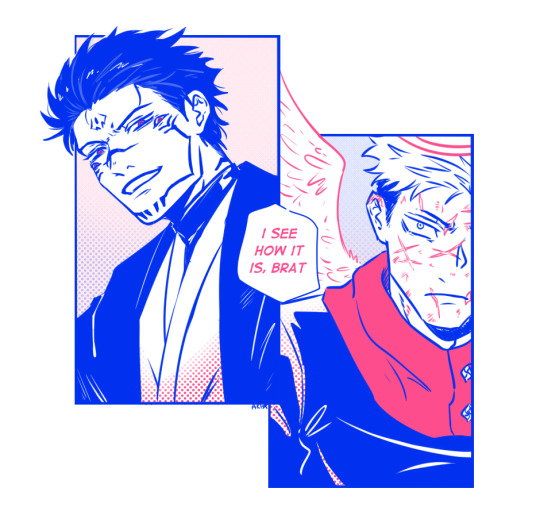
#akim0ri art#jujutsu kaisen#yuuji itadori#ryomen sukuna#i am reposting from my twitter don't mind me#this idea inspired from others theory of Angel taking Yuuji as their next vessel after Hana O)-)
5K notes
·
View notes
Text
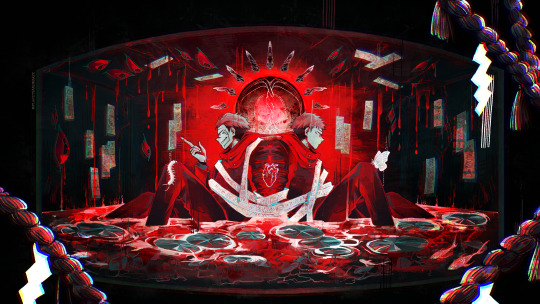
forced coexistence
#jjk#jujutsu kaisen#itadori yuuji#ryomen sukuna#my art#artists on tumblr#jjk 248#kinda? i drew this before the chapter came out lmao#this was inspired by twin theory and the kodoku ritual but well it fits the chapter so eh#something something conjoined souls stuck in a box
780 notes
·
View notes
Text
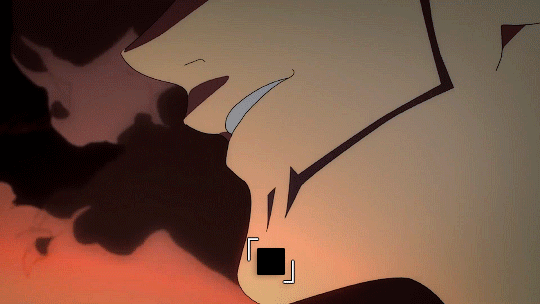
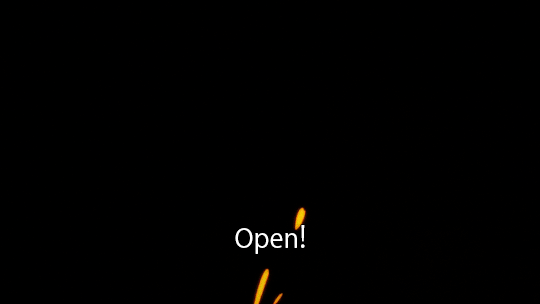

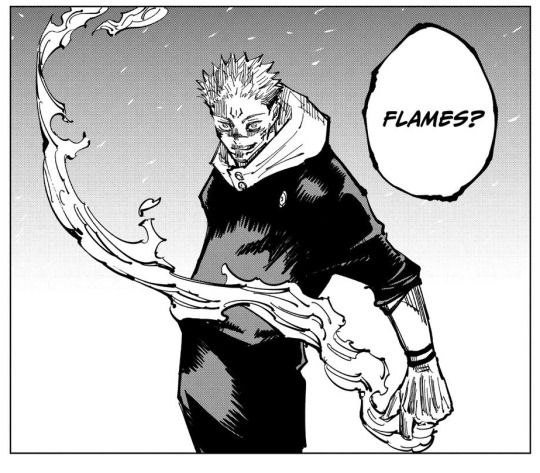
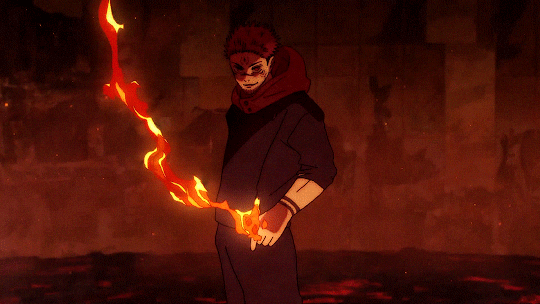
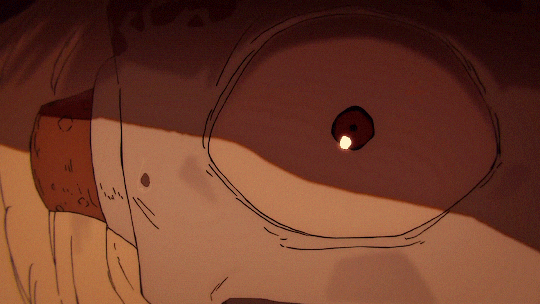
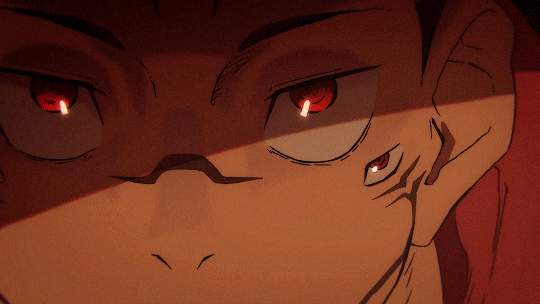



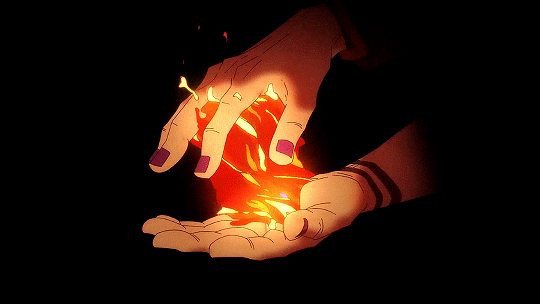
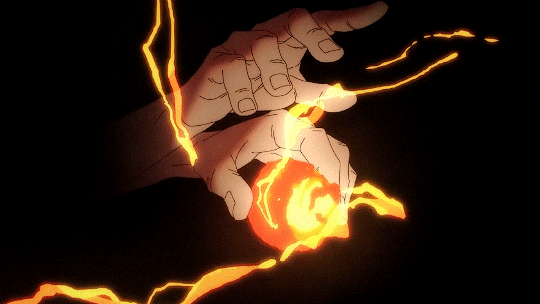
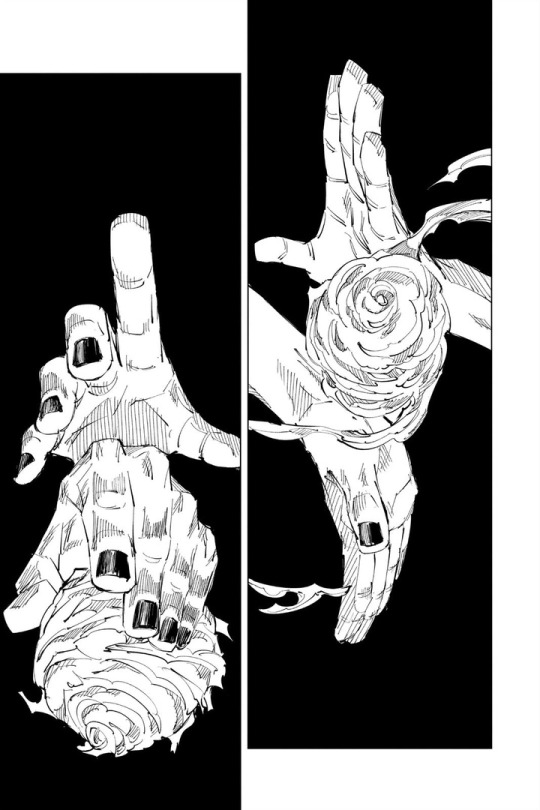
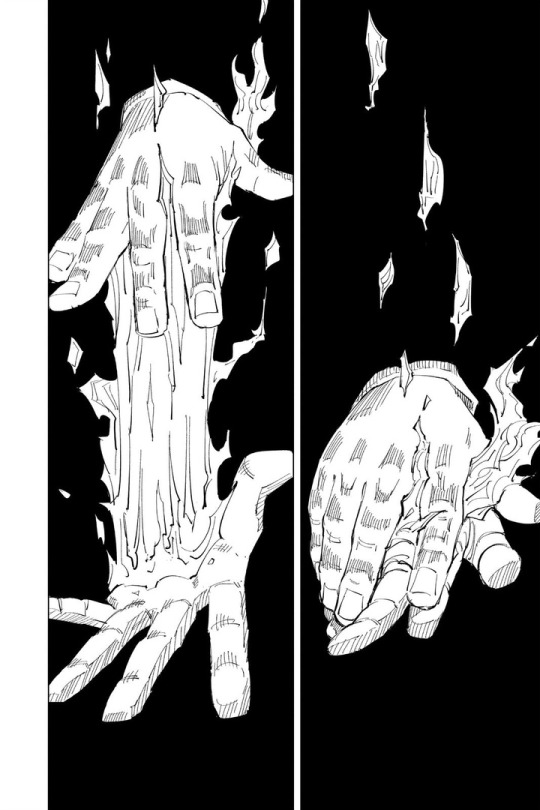
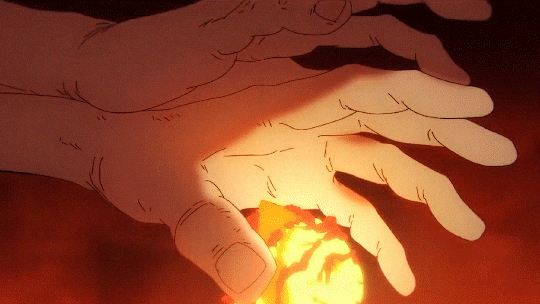
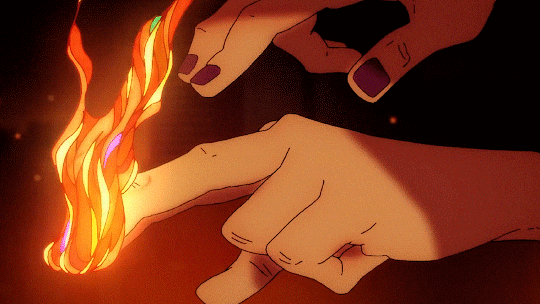
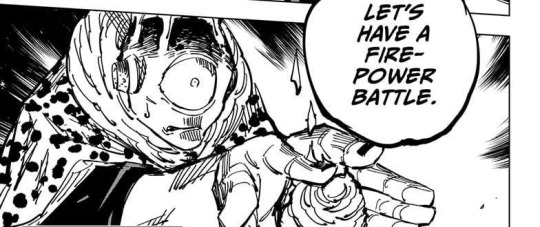

Jujutsu Kaisen | Jogo v. Sukuna
S02E16 V. CHAPTER 115 & 116
Though you have managed to pique my interest. So I'll fight you with your own specialty
#ryomen sukuna#sukuna#jjk spoilers#jjk#jujutsu kaisen#呪術廻戦#宿儺#宿儺 v 漏瑚#漏瑚#jogo#jogo jjk#shibuya arc#ohhhhh#i'm so excited and the phrasing used by Sukuna really pushes my theory on his technique#my japanese sucks#but the closest to what Sukuna says is:#開 (フーガ)#open (fugue)#this is insanely long ooopsssss#but this has always been one of my favourite scenes so giffing it and then putting the pics together??#AHHHHH i'm in heaven#mappa#jjk mappa#thank you mappa#jjk gifs#jujutsu kaisen anime spoilers#jujutsu kaisen spoilers
518 notes
·
View notes
Note
"He took the malevolent shrine in the divorce" is the fucking funniest concept I've heard today
Let Yuji have the house or the fucking shadow dogs, 2k23. 😭🙏🏼 Honestly, it’s the least that Sukuna could do to pay for all the damages.
#sukuita#a fraught marriage that’s falling apart and into a messy divorce#let higuruma sucker punch sukuna with alimony charges he won’t see it coming#malevolent shrine for itadori yuji ftw#i went to such a rabbit hole w the crack divorce theory i watched a clip#from a marriage story ya know the one w adam driver and scarlet jo#and i cried#in barely repressed hysterical laughter#as the image of sukuna and yuji superimposed the actors on the screen#thats a good edit idea ngl 🤣😂😂#jjk#jujutsu kaisen#sukuna#ryomen sukuna#itadori yuuji#higuruma hiromi
578 notes
·
View notes
Text
I've read a few good translations on Sukuna's revelations from last chapter and it's basically confirmed now that Kenjaku infused Yuji with one of Sukuna's fingers when he was born/created. This implies that when this happened:
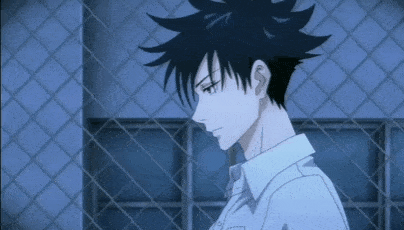
Megumi didn't feel the missing finger he was after but an unknown finger that Yuji had always carried inside him.
It had been said by Megumi that he felt the residuals from the box the finger was in. In retrospect, the image and intensity of Sukuna's presence fits Yuji's special constitution more than just the residuals from a box.
208 notes
·
View notes
Text
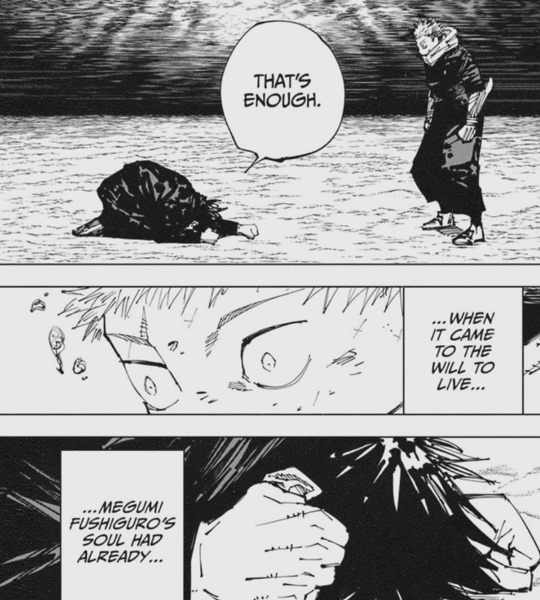
Megumi Will Start the Merger Theory
You heard me. I know this sounds wild and out of left field, but it's just a theory. A Jujutsu Kaisen theory. I fully acknowledge it might not happen, but please stick around long enough for me to argue why I think Megumi's character may go in this direction.
This one is for all the Megumi corruption arc truthers out there. I came up with this theory when it became clear that saving Megumi from Sukuna's grasp was going to be more difficult than just giving him a motivational speech, or punching Sukuna until their souls separated. Furthermore, I believe that Jujutsu Kaisen's manga won't end with the defeat of Sukuna. There will be one more curve ball thrown at us by Gege in the late game, and this is me trying to anticipate the pitch before the baseball hits me in the face. Underneath the cut I will speculate on the direction that Gege may take Megumi's arc, the relationship between Sukuna and Megumi, and Yuji's role in the finale.
What is a Corruption Arc?
Before digging in too deep I want to explain what I mean when I say I'm a Megumi corruption arc truther. A character arc is a story arc in regards to a character where a character changes from beginning to end. That's the most basic definition, arcs can be more complex, some arcs are actually inversions of the standard character arc where a character is defined by his lack of change.
However, those still need some element change, sometimes characters around them change to show contrast. For example, Eren is a stagnant character from beginning to end in Attack on Titan, but characters like Mikasa, Armin, Jean all grow up to show by comparison how little Eren has grown. Sometimes circumstances change around a character, and their lack of growth is a failure to adapt to those circumstances.
A character arc requires a change, but it's not necessarily a positive change. Often called negative character development, these characters regress instead of grow. This happens in many ways. One of the most basic examples of a character arc is a want / need arc. A want / need arc shows an emotional hole in the protagonist's life that needs repairing and how resolving the plot allows them to fill that hole. The protagonist usually knows what they need, but they know what they want, and often what they want won't actually fix them.
For example if I'm feeling sad I want to eat donuts to lift my mood, but what I need to do is learn healthier ways to work through my negative emotions. A character who keeps pursuing what they want, instead of realizing what they need won't grow, that's negative character development.
That's just one example though, Gege gave us a blueprint for a corruption arc in Hidden Inventory.
In Yu Yu Hakusho the character Sensui (directly cited by Gege as his inspiration for Geto in an interview) once was a spirit detective like the protagonist. No one describes him as corrupt from the beginning, in fact he's constantly described as more pure and upstanding than delinquent Yusuke Urameshi who likes getting into fights. He has a strong sense of justice, but rigid black and white views that come with it. Once he's confronted with evidence that directly contradicts his demons bad, humans good paradigm he cannot cope, and the narrative all but states Sensui's purity traditionally a good trait corrupted him because of his inability to adapt and his rigidity in in his beliefs.
Sensui goes through a corruption arc, albeit one offscreen and mainly referred to in backstory.
Geto's happens onscreen in its own story arc where he is one of two main characters. Much like Sensui he's presented to us as a sorcerer like Gojo, but unlike Gojo he believes sorcerers are obligated by duty to protect non-sorcerers who have no way of fighting against curses. You could argue that in some ways Geto and Gojo are the same type of jerk, but Geto's principles are clearly set up to contrast Gojo who at that age only was a sorcerer to flex his abilities. Geto's friendship often has him lecturing Gojo about respecting others, paying special attention to Gojo's feelings in ways that other characters don't, and also not being afraid to clash with Gojo over differences in morals.
If Geto is corrupt from the beginning there's no arc there, so he's clearly set up as being the moral fiber to contrast Gojo. We are literally presented with a scene where Gojo admits he could kill the non-sorcerers who hired a bounty hunter to assasinate Riko and feel nothing, and relies on Geto to make a moral judgement in his place, that society will already punish them and their slaughter is pointless.
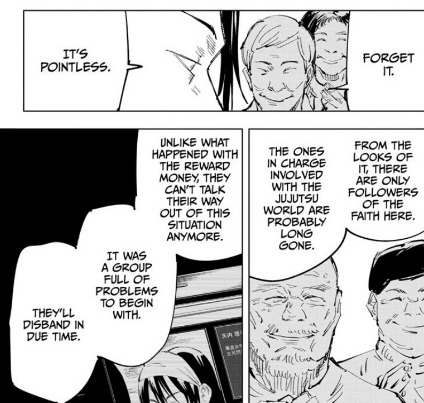
The irony is that later, Geto will engage in pointless slaughter killing an entire town in retribution for their abuse of Nanako and Mimiko. When Gojo confronts him about his actions, Gojo cites the same reasoning that Geto provided him to stop him from killing the cult members.
That Geto's murder of innocent civilians is pointless, because it won't achieve anything - his world of sorcerers is out of reach. Geto's clearly positioned as Gojo's moral tether, because he cites Geto's statement of only killing when there's meaning to it right back at him.
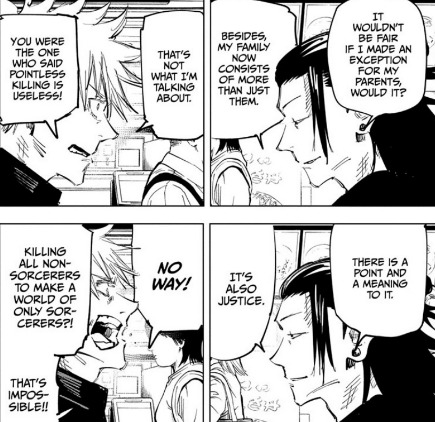
This is also where the corruption part of his corruption arc comes in, a change has taken place here. Geto hypocritically contradicts his earlier words, not just engaging in meaningless slaughter but also punishing people with his own hands instead of letting the justice systems in place take care of the punishments. Two things he held Gojo back from doing, only to do himself post corruption arc.
You could cite many things as the reason for Geto's corruption arc, but the common theme shared with Sensui is resistance to change. Geto saw the world in two distinct categories strong / weak, the same way Sensui saw humans good / demons bad. When Geto is shown that weak people are capable of bonding together to oppress strong people (the cult) and that sorcerers despite having strength are on the losing end of their society (they are expected to risk their lives and toil endlessly for curses 99% of the population can't even see), he cannot cope.
He especially cannot cope with the reality that Rika's death showed him, that he is not strong as he once believed. All of this combined leads Geto to double down, still seeing strong and weak as separate categories but now blaming normal citizens for the inherent corruption inside the Jujutsu World. Notice how Gojo a character with positive development seeks to reform from inside the Jujutsu World instead.
Geto also still wants to think of himself in the strong category, rather than facing the feelings that Riko's death and his helplessness in that moment gave him, as well as Gojo pulling he instead decides to double down on the idea that he's in the strong category, that he's superior.
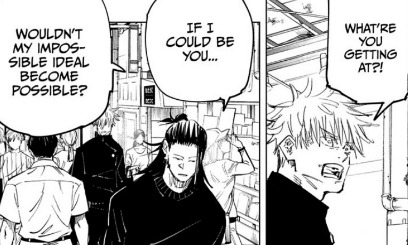
Geto even remarks jealousy at Gojo's godlike power for the first time, when before this he's always been the only person to treat Gojo as an equal - because Geto doubling down on his superiority complex begins imagining himself above others and therefore untouchable by trauma. It's also a grab for agency, because in this world sorcerers are rather agenciless, forced to be cogs in an unfair system. Geto incorrectly assumes agency = power. If he possessed Gojo's power he would be able to grab his agency back (which is simply incorrect because Gojo is one of the most agenciless characters in the manga, defined by his rigid role as the lynchpin of society).
Geto also doesn't mature. A mature adult lives in the world, and accepts that the world is imperfect. Geto is remarked as childish, first by Shoko when they are smoking together "sulking because no one understands you... sounds awfully childish if you ask me", and then by Yuta "You think you're a god? You sound like a kid!"
So we have, refusal to grow up, refusal to adapt to a complex world, resistance to grief, and grabbing for agency and power instead of fixing an issue inside himself - all of these combine to make the Jenga Tower that is Geto Suguru collapse.
The central question of Geto's arc, spoken by Gojo to Yaga is "Is it possible to save someone who doesn't want to be saved?"
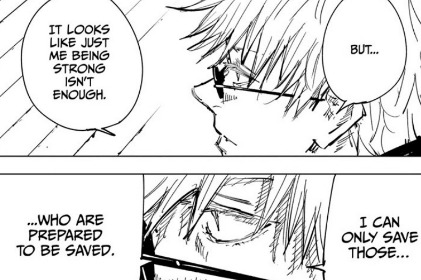
If Geto refuses all help, refuses to admit that he's wrong, and does not want to change then what really can Gojo do in this situation? Was he right to give up? Did he give up too early, refusing to kill Geto but also spending ten years just ignoring the problem until Geto attacked in Jujutsu Kaisen Zero? Did it not matter what Gojo did because ultimately Geto's choices are his own?
There's no clear answer, because it's a question the author is asking the audience to ponder. It's also a question directly set up for Megumi to answer, because when Gojo is unable to do a thing for Geto we see his next action is to seek out Megumi. His words imply that he sees Megumi in Geto and advises him not to be left behind, he also clearly became a teacher in order to not let what happened between him and Geto repeat in the next generation.
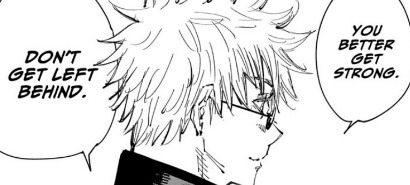
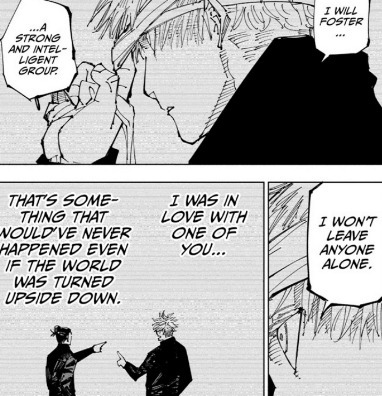
In spit of Gojo's best intentions, he's not able to protect Megumi from any of Sukuna's designs toward him, or basically anything that happens in post Shibuya's. Simply raising Megumi to be strong, did not prevent him from suffering trauma in his youth on Geto's level.
There's even a deliberate parallel, they both witness the death of an innocent who they promised to protect (Tsumiki, Riko Amanai) and they both have had their body taken from them, Geto's corpse is turned into a literal puppet to help advance Kenjaku's plans, Sukuna steals Megumi's body in order to revive himself in the modern era. They're both even used as tools against Gojo, Kenjaku uses Geto's body to awaken memories in Gojo and complete the sealing. Sukuna uses Mahoraga to learn the world splitting slash that cuts through Gojo's defenses.
Megumi also has a set of values that society spits in the face of. Megumi wishes to selfishly protect his sister, and pick and choose who to save. Geto believes the strong are obligated to protect the weak. Geto sees weak people who are corrupt and not worthy of his protection and also the reality that sorcerers are the exploited class, Megumi is forced to kill Tsumiki with his own hands.
These are intentional narrative parallels to show the risk of Megumi may walk the same path as Geto, especially since Megumi is in many ways a pure child like Geto himself.
Dark Phoenix Arc
There's one more corruption arc I want to compare Megumi's too, to give some idea of where I expect Megumi's arc to lead.
The Dark Phoenix Saga commonly refers to the story in Uncanny X-Men #129 - 138 of Jean Grey’s corruption by the power of the Phoenix and the Hellfire Club. It was considered incredibly shocking for its time. One thing to note is while Jean Grey is famous nowadays, in early X-Men she was the weakest character and her role was basically limited to “The Woman” of the team.
Elevating the helpless damsel woman to the most powerful member of the team, if not the entire universe and then having her turn evil had never been done before. It was a jaw-dropping shock at the time.
The reason I am citing the Dark Phoenix arc as an example, is because both Jean Grey and Megumi's character arc revolves around themes of agency, how it's stolen from them and how they reclaim it.
The basic summary of the Phoenix arc is that Jean Grey is initially given a massive power boost when she's possessed by the Phoenix. She stays behind on a crashing ship only to be saved by the Phoenix, a guardian, alien entity of immense power that was locked away in a crystal. Jean Grey returns as Phoenix with a massive power boost, but there's several ambiguous elements that compromise her agency. It's implied that Jean Grey always had a tremendous power that was in part sealed away by Professor Xavier using his telepathy (infringing on her agency) and that while the Phoenix gifted Jean Grey power, it's also an alien entity effecting her mind and body.
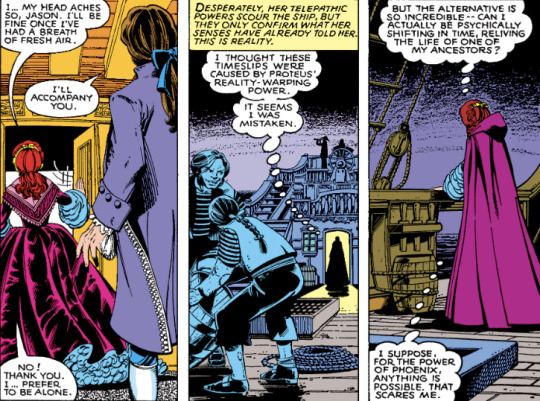
On top of that when she acquires the power, outside forces begin wanting to manipulate Jean in order to gain her power for their own ends.
A group called the Hellfire club begin to psychically tamper with her mind. They trap her in hallucination world where she is a woman of the 1800s, (not famously known for their agency) and in love with the leader of the Hellfire Club, even going so far as to give her false memories in order to convince her that this is reality.
The concept of agency and how it's constantly infringed upon, even by someone who's supposed to be on her side (Xavier) is central to this arc. Jean evetually escapes from the Hellfire club's manipulation, and reclaims her bodily autonomy but the story does not end there.
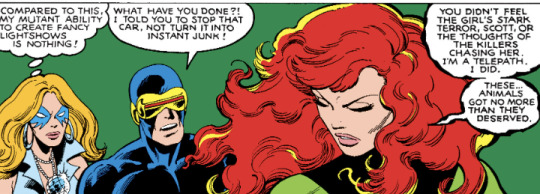
The subtle changes in Jean's behavior still continue, even after Jean has freed herself from the mind control. Is this the result of being given too much power at once? Is Jean losing control because she was never taught to properly handle her powers?
Jean Grey is also the character with the strongest potential in the main cast (much like Megumi) and also a character who's been prevented from using her powers to their full potential and even had her powers stolen and used by others (Much like Megumi).
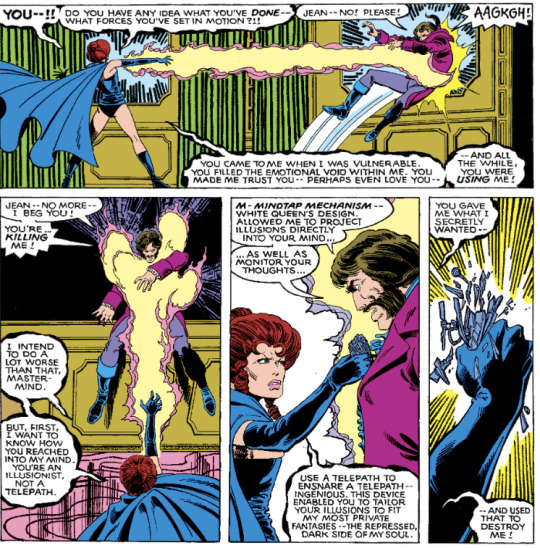
It's heavily important that Jean's corruption into dark phoenix happens after freeing herself, and in response to the Hellfire club's machination to take all agency away from her. Jean instead makes a grab for power and agency by abusing her power as Dark Phoenix.
Jean even mentions that turning against her friends and trying to kill them as Dark Phoenix, will sever the last tie holding her back, will get of Jean Grey for good and cause her to fully embrace being Phoenix.
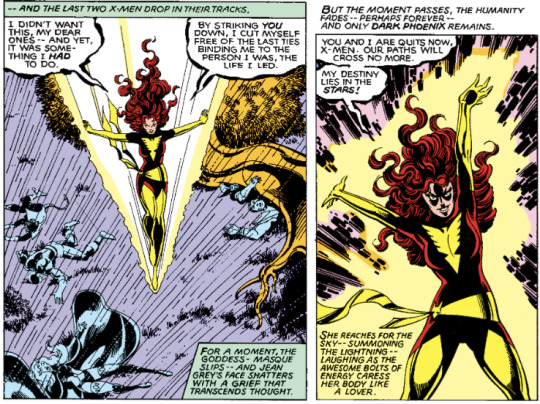
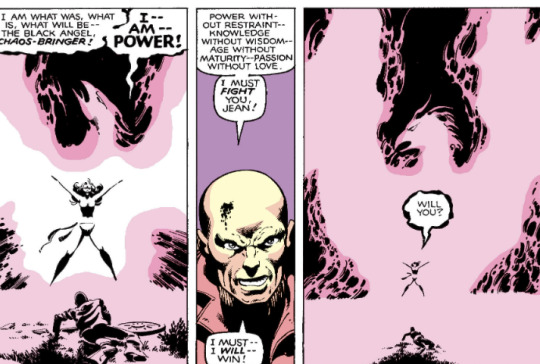
Jean has flipped entirely, overembracing the power and agency that has been stolen from her again and again, but really how could someone not desperately try to take back control of their lives after being mind controlled or having their mind violated multiple times (the phoenix itself, the hellfire club, even by Xavier).
How can someone never allowed to use her power, or given choices on how to use her power, not be corrupted when after being stepped on all of their lives the power of a god is dropped into their lap?
This is why I believe Megumi will be the one to initiate the merger, because his entire arc has been about having his power stolen away from him and what would Megumi do when given total power over the merger by Kenjaku?
Megumi Corruption Theory
The biggest piece of evidence for this theory is right here, Kenjaku specifically says to give Megumi Fushiguro the authority to start the merger.
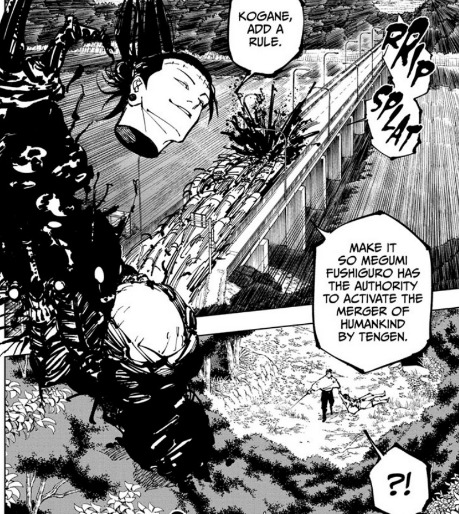
There's a technical reason for this, Sukuna is currently in Megumi's body, and Sukuna himself was actually registered in Yuji's place because Yuji was built by Kenjaku to be a cage for Sukuna.
However, it can also be read as foreshadowing. If you believe like I do that the merger has to happen, then Sukuna can't be the one to initiate it. The simple reason why is that the main characters will have to be alive to fight against a merger, and Sukuna has set the condition that he'll start the merger after killing the main cast in order to motivate them to fight him with everything they have.
If Sukuna is going to start the merger after killing all the main characters, then he can't be the one to start the merger because the main characters have to be alive to witness the merger take place and fight against it somehow.
Therefore, logically if the merger is going to occur the only person who could possibly activate it is Megumi Fushiguro after reclaiming his body.
There's more foreshadowing then this one instance however, and a lot of it revolves around Sukuna and Megumi's unique relationship and Sukuna's role as a character.
As for why Megumi would possibly start out the merger, it's the same as Jean Grey, a character denied of agency suddenly has all the power in his hands, who wouldn't be corrupted? Especially Megumi, a character who's just been robbed of his sister and his mentor, and his purpose in life besides that (protecting Tsumiki)? Why wouldn't he lash out if suddenly given the power to? His friends are trying to save him yes, but Megumi is begging those save friends not to save him to end it all.
How do you save someone who isn't prepared to be saved?
How is the story going to answer that question, if saving Megumi is a matter as simple as just beating up Sukuna and giving his body back to him?
Onto analyzing more foreshadowing, but first a brief tangent on the nature of foreshadowing in Jujutsu Kaisen. Every major twist in the manga is foreshadowed far in advance. Kenjaku beng the one to possess Geto's body - foreshadowed by Kenjaku killing Mechamaru when Geto was against killing young sorcerers, and the fact Geto was deliberately killed onscreen with no explanation provided to the audience on how he could possibly revive.
Sukuna calls the purpose of the bath to be near evil, to submerge Megumi's soul.
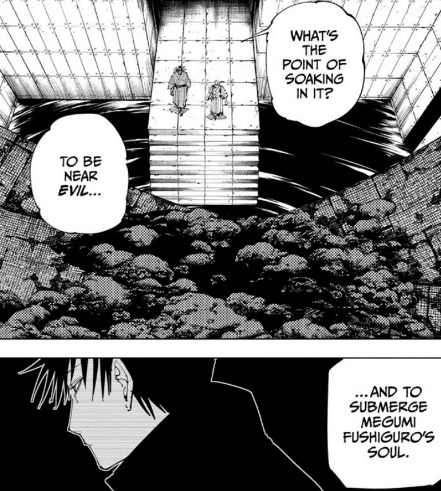
If saving Megumi is just a matter of ridding him of Sukuna's possession however, then how does that allow Megumi to reclaim his agency? What agency does a damsel in distress who just exists to be rescued have?
Megumi's entire arc has been defined by the potential power that everyone sees in him, and his inability to reach that power especailly since other characters (especially Sukuna) seek to steal that power for their own ends. In the culmination of this arc, Sukuna literally steals Megumi's body, and his bodily agency.
How does Megumi finally live up to that potential if Megumi's arc ends with him being saved by Yuji? How does this make Megumi grow or change in any way?
Sensui, who is once again Gege's model of a corruption arc is referred to as a pure angel that was inevitably grew scarred and defiled, by his close personal confidant Itsuki. Not only that, but sinking deep into despair made him grow stronger not weaker.
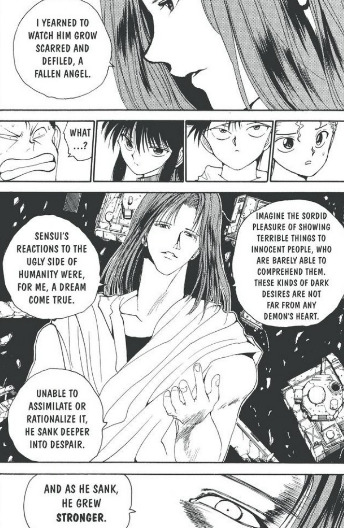
Itsuki is also, a demon who met and encountered Sensui and then took a deeply invested perosnal interest in watching Sensui be corrupted in real time.
Megumi also has a curse that took a sole interest in him because of his talent and potential, then had a hand in bringing him closer to evil in order to make him sink into despair. There's once again the symbolism of purity being corrupted.
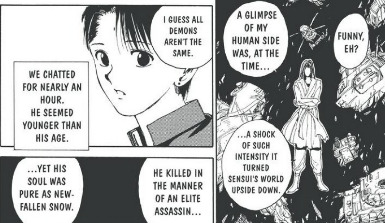
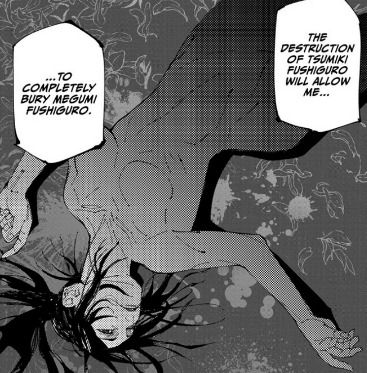
This panel explicitly shows white lilies (symbols of purity) being torn apart and blackened to symbolize what Sukuna wishes to do to Megumi in order to further is own ends.
There's also the heavy budhist symbolism with Sukuna's role in the story, and the way he influences the rest of the cast, especially Gojo Satoru who is our stand-in for the Budha. If the goal of Jujutsu Society is to attain enlightenment (escape cursed energy probably the only thing that will end the miserable lives of sorcerers), then the merger represents the opposite, Kenjaku's goal of optimizing cursed energy by mixing humans, sorcerers and curses to give birth to a new being.
That's also a conflict that needs to be resolved, but Sukuna by pushing forward the optimizing of cursed energy and representing the peak of sorcery living only for sorcerery and his own strength represents a Mara.
Sukuna is comparable to the Celestial Demon Mara in budhist mythology, more on it in this thread. In budhist cosmology, Mara is the “personification of the forces antagonistic to enlightenment.”
If the ultimate goal of budhism is to escape the cycle entirely and stop being reborn in the sensuous realm, Maara instead tempts people to stay in this realm. it defines impernanence by suggesting we stay in this realm forever. It defies Dukha by saying we indulge in physical pleasures in this realm, that we should seek to satisfy ourselves even if budhism argues that life is primarily unsatisfactory.
We even see Sukuna literally tempt a budha-like figure into remaining in this earthly realm. After all aren’t we shown that Gojo achieved enlightenment at seventeen and let go of earthly emotions like the need to be angry and avenge Riko’s killer because the feeling of oneness with existence was too good in that moment.
A lot of people noticed what they thought was Gojo acting out of character in the fight with him and Sukuna, by enjoying the fight and choosing his selfish desire to love jujutsu and fight as a sorcerer over his responsibiltiy to protect children. Something which Nanami says in his dying hallucination that Gojo only ever lived for the pursuit of his selfish desire for Jujutsu in the first place.
Gojo in his last fight against Sukuna forgets about saving Megumi or at least makes it a lesser priority, because Sukuna tempts him to do what he's always wanted to go all out in a sorcery fight and have the freedom to use his powers to the best of his ability. Hoewever, even after using his full strength, Sukuna cuts down the notion that he is above humanity and drags him back to the earth - literally calling him unenlightened.
“This is goodbye. You were born in an era without me and hailed as the strongest yet you turned out to be painfully ordinary…”
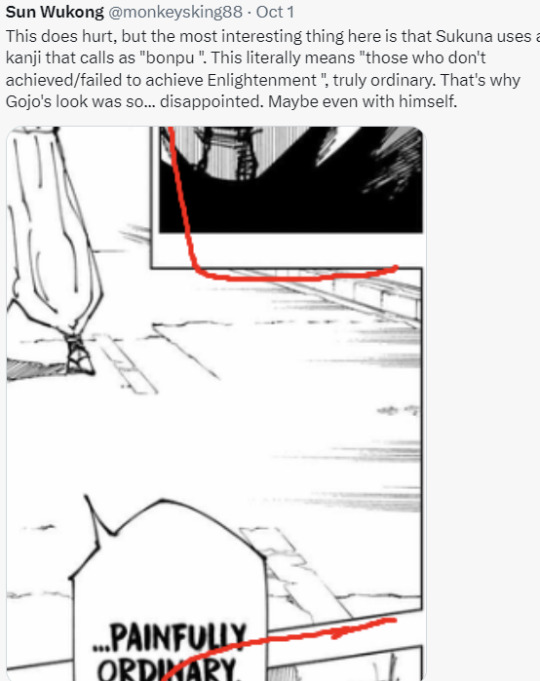
Does Sukuna not represent this temptation for all characters? Sukuna represents the selfish ideal of sorcerers, using his powers for himself to satisfy his hedonistic desires and because of this he has the most agency in the story and the story at times even bends to his desires.
Characters even fight for Sukuna's recognition, Hajime, Jogo and Gojo are validated by that same recognition in theend.
Why wouldn't Gojo and more importantly Megumi who are characters with very little agency not jump at the chance to be more like Sukuna, especially if it brings Sukuna the freedom he possesses?
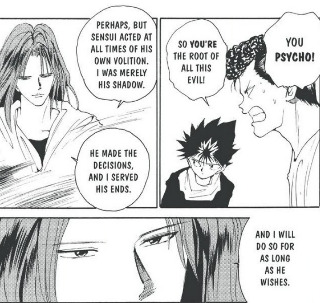
Itsuki refers to himself as Senseui's shadows, leading him to act on his darkest impulses and enjoying watching the corruption spread. Megumi is literally a character who's Jujutsu revolves around his shadow, and summoning powerful Shikigami from it in order to fight. A character with an incomplete domain expansion (another loose plot thread with Megumi that would be unresolved if Megumi were simply saved) which is his own creation, which might surpass Mahoraga the technique handed to him.
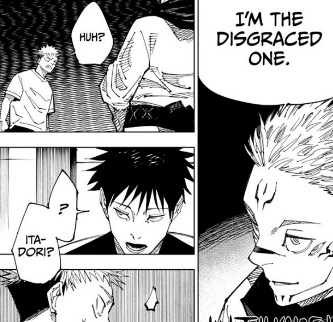
In addition to being a Mara, Sukuna is also literally called the "fallen / disgraced one". Itsuki calls Sensui a fallen agel, but in the context of Jujutsu Kaisen there's literally a character called Angel, who's only goal is to save Megumi's soul, and there is a satan figure in Sukuna who wants to corrupt him. Literally, there's an angel and devil on Megumi's shoulder.
How is stealing Megumi's body corruption though? Megumi's not being tempted into being selfish. He's not responsible for any of the sins that Sukuna commits in his body. There's no arc there, because Megumi doesn't reclaim his agency in response to having it stolen away, he doesn't decide to do the bad things himself - it's Sukuna who commits the wrongs.
Even More Setup for the End Game
Here's where I stop referencing Yu Yu Hakusho and only use foreshadowing in the comic itself. The first is the discussion of roles, and how Yuji needs to break away from them, as much as Megumi needs to fight for his agency back.
Part of the reason Sukuna jumped bodies is because Yuji wanted to be given an easy role like a character in a story - rather than thinking and deciding for himself. He thanks Megumi and Gojo for giving him a role seconds before the body swap happens. If Yuji is immediately punished for thinking that what he needs is to be a cog in the machine, to be given a role then methinks that's a bad thing.
However, Yuji has not broken away from that thinking in any significant way. Sukuna even mocks him for finally being given a role.
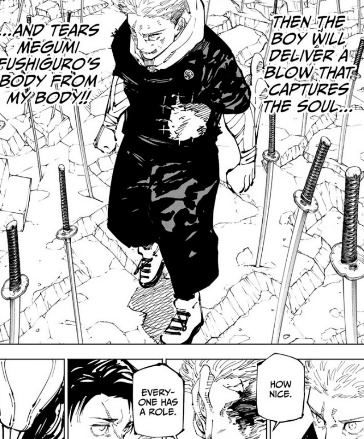
If Yuji's thinking hasn't changed then no story arc has taken place. If this conflict of Yuji wanting to conform to a cog or a role has persisted since Shibuya - then it's clearly important to his arc and is something that needs to be resolved. If Yuji just solves the problem by being stronger than Sukuna and beating him in a fight, how does that resolve Yuji's flaw of clinging to roles rather than thinking for himself? I ask once again, where's the change?
Saving Megumi like a damsel in distress is still a role someone else has assigned him.
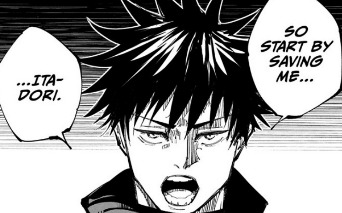
How does the decision to save Megumi right now challenge Yuji's hero complex in any way, besides the fact that Megumi has sunk into despair and would rather just end it all. Is that much a conflict that really forces Yuji to think for himself - to go against the grain of society rather than blindly following others.
If Yuji gets to rescue Megumi like a damsel, that's giving him what he wants, without forcing him to realize what he needs. That's as much of an unfullfilling end to Yuji's arc as a ending where Megumi never reclaims his agency and stands on his own feet and just has to sit there and wait and be passively saved.
Most of all the question: "Is it possible to save someone who's not prepared to be saved?" goes unanswered.
Geto wasn't just depressed and suicidal, he was actively making harmful choices and represented a danger to others. He also had no intention of stopping the path that he was on.
There's a clear parallel between Megumi and Yuji's friendship, and Geto and Gojo's past fallout. However, if it's just a conflict of Yuji saving Megumi who's simply too suicidal and doesn't want to go on living, there's no conflict there. The audience will not see whether or not Gojo was still capable of saving Geto post his burning down the village, or if there was no walking back from that choice. The previous generation won't resolve or fix the mistakes of the past generation.
Yuji remains a hero, Megumi remains a victim, as I reiterate for the thousandth time there's no change.
Megumi starting the merger, or even defeating Sukuna himself (maybe with a completed domain expansion) and then starting the merger is a change. It's also foreshadowed, Mahoraga is the technique he inherited, the technique Sukuna stole (and Mahoraga won't work against him he's already defeated it), Megumi's domain expansion is his own creation, created in his deepest moment of personal growth.
The process of individuation also literally requires a character fully integrating their shadow. Sukuna possessing Megumi is not Megumi facing his shadow or his worst traits, because Sukuna is not Megumi's shadow, he doesn't reflect Megumi's flaws in anyway, he's literally just a parasite.
There's also the 1001 Toji parallels to Megumi that have gone unfulfilled. Toji specifically a character who was abused, then chose to continue the cycle of abuse, specifically because he wanted to prove himself stronger than the peak of sorcery. Especially after a lifetime of being belittled and abused by not having the potential of his Heavenly Restriction recognized.
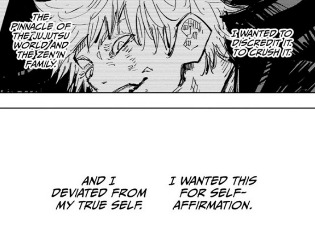
And what do we have here, but a scene of Toji LITERALLY EMERGING FROM MEGUMI'S SHADOW, in order to enter Dagon's domain.
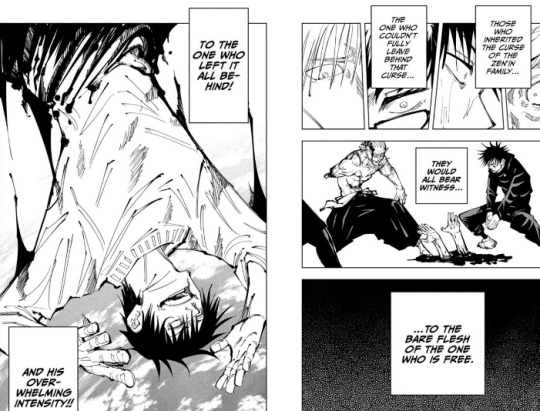
How is Toji referred to afterwards? As a puppet of carnage bearing his fangs at the strongest around.
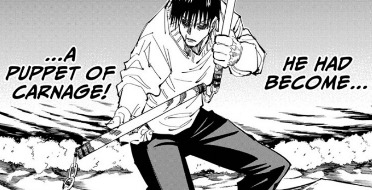
An incredibly Sukuna like description, number one because Sukuna's entire existence is simply bearing his fangs at the strongest around, and number two Sukuna is referred to as pure destruction, like a calamity, something with overhwelming sense of self and no humanity.
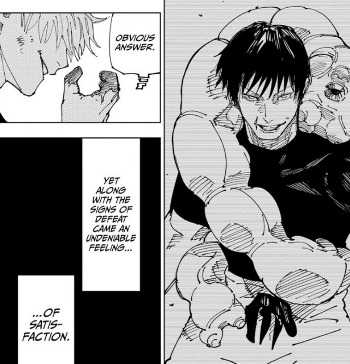
Not only that, but when fighting Sukuna, Gojo makes an explicit reference to Toji comparing him to Sukuna as the last time he ever felt nervous or challenged by an enemy. Sukuna and Toji are being alligned as similiar characters, supremely selfish people who hoard their agency and strength. Toji also represents the worst of Megumi, a victim caught in a perpetual cycle of lashing out against the world, a bad future path he might take if he doesn't get over himself.
Sukuna is connected to Toji wo is connected to Gojo, and all three represent a path that Megumi has been nudged down his entire life, that he should just selfishly use his power with no regards to anyone else the same way they do.
As I said before in my comparison to Jean, why wouldn't someone who's been robbed of all agency for so long, not go too far in reclaiming it? What's stopping them now that the chains are finally off?
Megumi parallels Geto, who parallels Toji, who parallels Sukuna and why draw all these lines between these characters if it's not to represent a path that Megumi could take?
In other words...
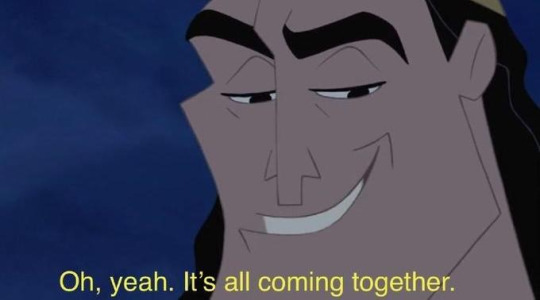
#megumi fushiguro#jjk meta#jujutsu kaisen#ryomen sukuna#geto suguru#fushiguro megumi#gojo satoru#jujutsu kaisen meta#jujutsu kaisen theory#jujutsu kaisen spoilers
188 notes
·
View notes
Text
‼️JJK SPOILERS‼️
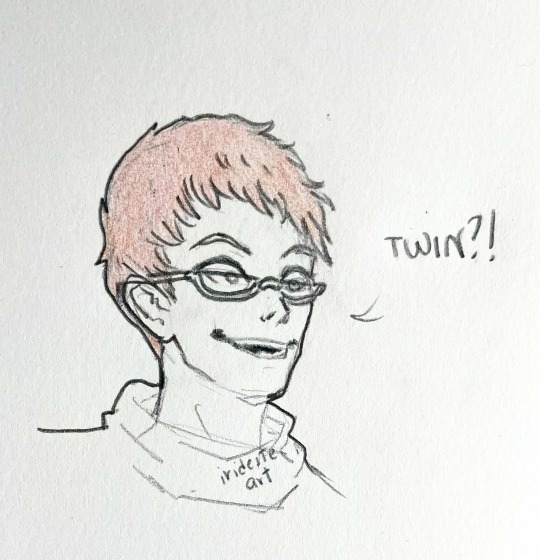

Here is the TikTok
With the music is even funnier 😂✈️
#digital fanart#digital drawing#fanart#jjk fanart#jjk art#jjk spoilers#jjk#jjk sukuna#ryomen sukuna#jujutsu sukuna#sukuna jjk#sukuna ryomen#jujutsu kaisen sukuna#ryoumen sukuna#sukuita#sukuna#sukuna art#jujutsu ryomen#jjk ryomen#jujutsu kaisen ryomen#ryomen#jjk leaks#jjk theory#jjk manga#itadori fanart#jujutsu kaisen itadori#yuuji itadori#yuji itadori#uncle sukuna#jjk 257
231 notes
·
View notes
Text
You were defeated by your own self , self-loathing,selfeating, Sukuna .- twisted power of love
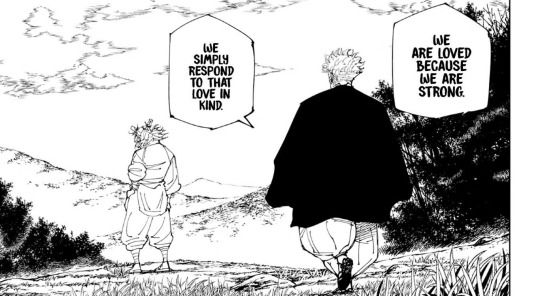
The projection of Gege's self-hatred onto his favorite character.
---The hardest battle you'll ever fight, is against yourself---
TL;DR
And thus, Yuji will strive to separate (Cut like Sukuna) his opponents BUT from their "evil" and direct his energy only towards this "evil," which is the opposite of a Sukuna's self-hatred power ,Yuji can be viewed as a mirror reflecting Sukuna's twisted power of love.
Therefore, the first chapter essentially, by title, reflects Yuuji and Sukuna
Sukuna's statement that "only the strong are loved" ("strong" can be of different kinds)takes on a particular significance: he attracts love through his strength , highlighting his main conflict reflected in his relationship with Yuji. For Yuji, strength and violence are alien; his essence is permeated with kindness. As a result, Sukuna feels his vulnerability, realizing that his achievements hold no value in Yuji's eyes. Experiencing self-hatred, he understands that while Yuji is simply kind to people, his love can be obtained "just like that," whereas towards Sukuna, Yuji harbors disdain, which is painful, as Sukuna has become strong out of a desire to receive love.
"Thus, he became strong because he realized that they loved strength, while he himself was weak. From this, he concluded that by being strong, he would receive love and respect simply for his existence as strong, and he would no longer feel weak. Therefore, his desire for love lost its significance, as only the weak needed it. Now his primary strength became his "love". And this means that using this strength towards himself and others can be compared to its application on the battlefield, where it is used to defeat the enemy. Thus, those who seek love from him will be destroyed, because all he has and who he is, is strength. Without it, he is nothing. "This implies that he cannot be loved because only the strong are loved". Thus, this expresses contempt for weakness, as the weak rely on "love" and connections, while he, being strong, does not need these connections, leading to rejection of both self-love and everything associated with it, and therefore, it is an expression of hatred.
The application of force (hatred) even towards oneself, towards one's weakness - the human side.
Thus, the application of force towards oneself and one's weakness in this context becomes a manifestation of contempt for the human side and dependence on love. This path can be interpreted as an extreme way to achieve self-assurance, which, nevertheless, cuts off from love and leads to hatred towards both oneself and the surrounding world.
The application of force towards oneself and one's weakness here is presented as a way of rejecting love and refusing to accept the human side - thus self-denial-self-eating.
This contradiction is manifested in the irony of the situation: a person becomes strong in his desire to rid himself of his weakness and dependence on love, but as a result, he becomes consumed by hatred, both towards himself and towards the surrounding world.
This desire is expressed through the denial of the human side, the refusal to accept one's weaknesses and dependence on love. This leads to strength becoming the main attribute of personality, while human connections and emotions, such as love, are rejected as unnecessary and even harmful.
Thus, the application of force towards oneself and one's weakness, as well as the denial of love and dependence on it, create a cycle of self-destruction and hatred towards oneself and the surrounding world. This can be interpreted as a path that, although aimed at achieving self-assurance, ultimately leads to isolation and spiritual destruction.
The cycle of samsara.
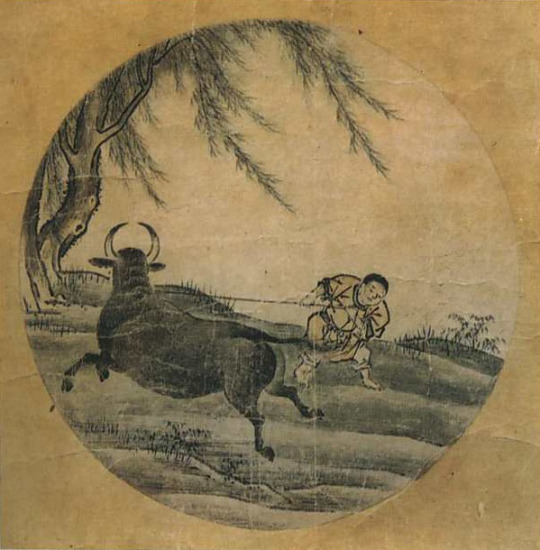
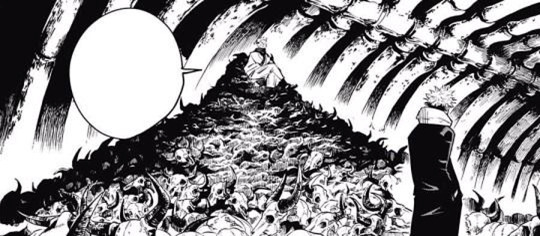
("twisted love ") his curse and power "kitchen"- (10 bulls Buddhism- you can read in wiki ) - he literally kills (eats) the “bull” "human" his own self constantly, so there are a lot of their skulls inside him - his own , and he sits on the throne of them, his essences, believing that he has “surpassed” himself - the human nature
"Sukuna is surrounded by the remnants of his failed attempts to transcend his ego, symbolized by the "skulls" of his former selves."
maybe this is part of the “vow” of constantly fighting (eating) within yourself
Self hatred
Like the seals on his shoulders - circles
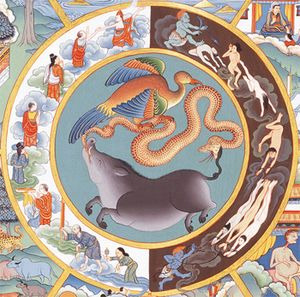
Sukuna is the strongest because he suffers the most, hates himself and experiences an internal conflict that generates cursed energy.
Anger (rage, aggression, a sense of vengeance, disgust) is represented in the image of a snake. The snake typically slithers away when approached by a human or attacks them. Similarly, a person seeks to eliminate an irritating object from their field of perception, either by avoiding it or destroying it. This is similar to his behavior and avoidance of Yuji - the epitome of absolution - kindness, because he unconsciously experiences disgust – the truth.
The Rooster is a symbol of passion, as it is both the owner of a harem and capable of finding a tiny grain in the grass and dust – exactly what it needs; just as passion keenly selects its object of desire from the multitude presented. This can be compared to how Sukuna chooses his opponents.
Ignorance (neglect, stupidity, laziness, foolishness) is represented in the image of a pig. The pig eats everything indiscriminately, unable to discern between good and bad, fortunate and unfortunate due to its lack of understanding. Incidentally, the pig is the only animal unable to lift its head to the sun. However, Sukuna usually regards others disdainfully from top to bottom, like a large pig, experiencing "foolishness" because he has confined himself within the pigsty of his own convictions.

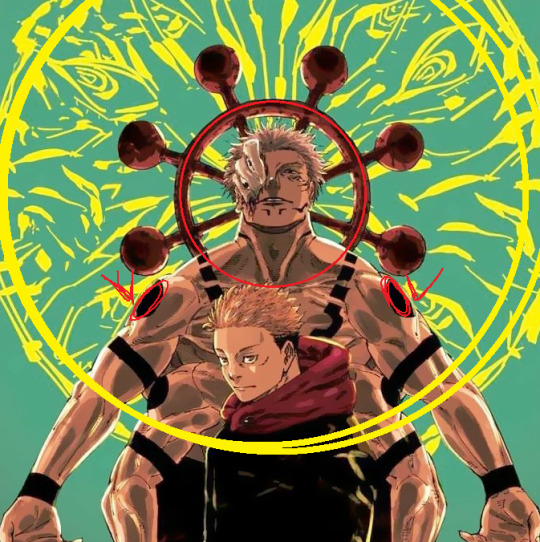
Perhaps not intentionally, but symbolically, Yuji's head is at the level of his heart.
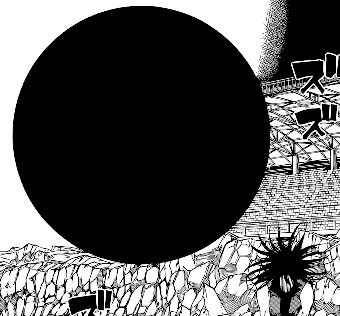
In other words, the cursed energy spawns a concentration circle of hatred , trapping individuals in an endless cycle of conflict,a cycle of samsara- in which people remain fighting with another person with their emotions. - mostly hatred
This could be seen as a vow or a struggle to overcome one's own limitations , by constantly confronting and consuming aspects of the self.

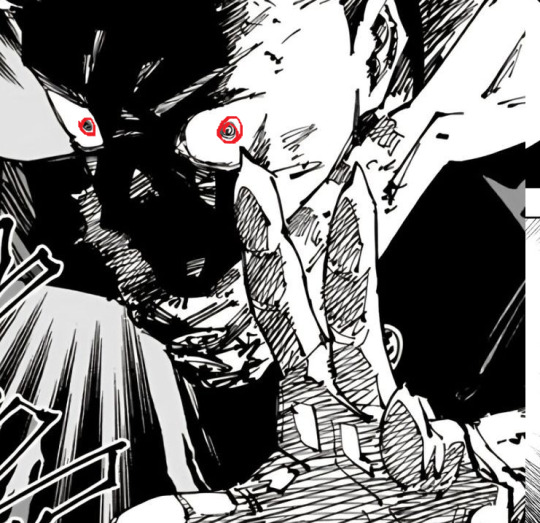

"You weren't merely defeated by external forces, but by your own internal strife—your perpetual disdain for your human side."
your downfall stemmed from your own internal contradictions, which morphed into a binding oath (all his seals on his body literally seal a person in him). Your disdain for humanity, extending even to yourself, became both your strength and your curse, corroding your soul from within (gestures toward the mask).
(the mask) Much like Tengen, embodies a constructive "emptiness" that exists harmoniously with the world, at peace with people. However, Sukuna's "emptiness" is purely literal, representing a detachment from humanity, a void of sorts.
You've lost all sense of purpose, consumed by self-loathing to the point of utter emptiness.
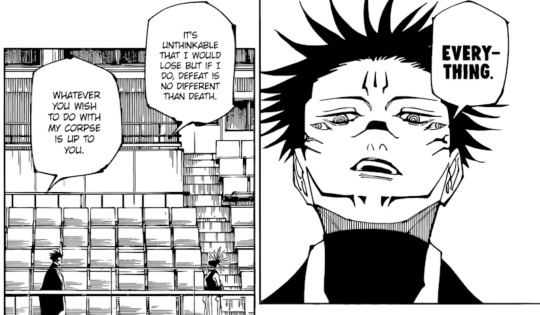
he is his strength - and if he loses, he "strength "will die, which means to him that he is nothing(because "I" = strength ),( which everything) he can feel , towards "him " is hate, emptiness ,insignificance - nothing - cant take "love".
nothing is nothing - so it his - corpse
paradoxically there cannot be “love”, because only the “strong” are loved.
It's as if he can't even comprehend the idea of being loved or valued without his strength.
Without it, he feel like a mere shell of himself, devoid of purpose or meaning. - corpse
his "manhtra "
His strength defines him, and should he lose it, his very essence will wither away, leaving him feeling like nothing.-(which everything to him.) Because in his eyes, strength equals identity, and without it, he is left hollow, consumed by feelings of worthlessness and self-loathing.
To him, strength is everything, and without it, he feels empty and insignificant. He's trapped in a mindset where only the strong are valued or capable of receiving love, leaving him unable to grasp the concept of being cherished for anything other than his strength. Without this defining trait, he fears becoming a mere shadow of himself, devoid of purpose and meaning—a walking corpse. His mantra revolves around the idea that his strength is synonymous with his identity; losing it would strip away everything that makes him who he is, leaving behind only a hollow shell consumed by feelings of worthlessness and self-doubt.
This fear of worthlessness drives him to cling desperately to his strength, as he sees it as the only thing protecting him from a profound sense of misery and insignificance. It's not so much a fear of death that motivates him, but a fear of experiencing the emptiness and smallness he associates with weakness.
So when he talks to Yuji he projects
You are my special
"Get lost in me" - "Become me."
I wanna feel your heatwave - Break down.
I love you, baby - I hate you
because you don't yield to me, to my strength
A world spinning in ambiguity - on the other hand, if Yuji does not give in, then Sukuna loses his “power” - himself and his hatred,"And will make him feel (1 )'loven'."- (This means that Yuji literally robs him of his purpose - his strength - himself - his self-loathing.)
(1 )This suggests that Sukuna's identity is closely tied to his ability to dominate others, especially Yuji. If Yuji resists, Sukuna not only loses his power and sense of self but also his profound self-hatred, leaving him vulnerable to experiencing an unfamiliar emotion—love. In essence, losing control and self-hatred allows Sukuna to explore a more vulnerable side of himself.
You are my special
"Even if the meaning is not correct, the fact is that they mirror to each other."
He wants to prove that his own existence and self-hatred are justified.
Sukuna conducts " a series of trials " before Yuji, aiming to prove to him that his purity of soul is not the basis of his strength. He expresses the belief that the source of strength lies in the ability to be cruel and hateful rather than kind. In his worldview, strength arises from self-loathing and denial, while love and compassion are seen as manifestations of weakness.
Sukuna seeks to affirm his beliefs through these trials and sufferings. He desires to break Yuji, to bring him down to his own level of hatred, in order to confirm his own existence and self-hatred. For him, pure strength becomes a symbol of his self-loathing - his own "self." He seeks to reinforce this hatred through Yuji, who, in his opinion, is excessively pure and capable of loving others unconditionally, which, in his view, renders his strength useless and undermines his own existence.
Overall, Sukuna's character is driven by a complex interplay of fear and a desperate need for validation through the lens of strength and self-loathing.
SURVIVAL
"You're so weak yet you cling to life?"
CHILD "I"- lack of strength" - weak and misery- unwanted , rejected, unloved, insignificant, unimportant, nothing, profound sense of emptiness and smallness.- DEATH
"You should spend your lives stifling (EATING)your misery. "
(Sukuna -Child - Yuji)

It seems to me that here it is being said that a brother or another close person can replace a parent in terms of providing love and understanding "self", as well as becoming a reliable support for the individual.
Perhaps previously he believed that self-love was meaningless (although he assumed this applied to others as well), but after encountering Yugi's soul, he realized that love, akin to dedication to an ideal, gains significance as it can transcend death and become something eternal, which is the true meaning. This enlightenment proved more significant than Sukuna's physical prowess, piercing his self-perception for the first time and shaking him to the core.
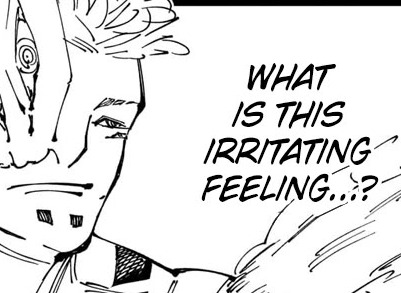
As the only thing he had been doing was killing time to die.
From the expression on his face in these two frames, there is a similarity: when it comes to love, he appears irritated, but this time he felt it - the love - and experienced pain, for the first time in a long while.

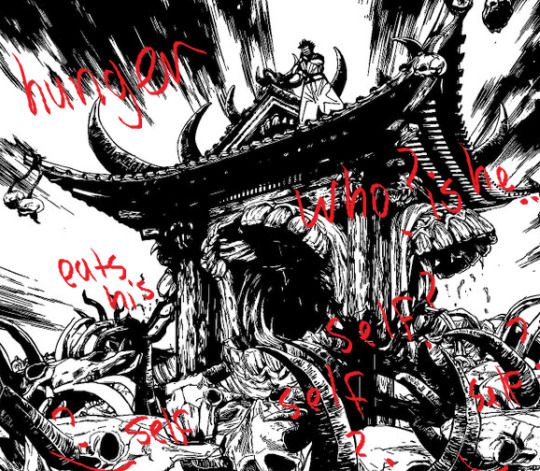
Sukuna, as the most powerful being, has moved away from the notion that his strength guarantees victory. Now it's more of a shadow of an ideal—meaning himself as well, because Sukuna possesses only power—a symbol of relentless personal resilience that he finds in Yuji. He has realized that without this strength, he is devoid of purpose, and in his pursuit of it, he has lost everything, including himself and his inner content. While in Yuji, lacking this power, his eyes shine like a beacon of humanity the love he needed—an ideal that transcends himself, through the idea of protecting others, akin to Prometheus his kindness. This irritates Sukuna and casts doubt on his own existence.
The deal is that Sukuna, regarded as the "strongest " was bored and annoyed with Yuji because his strength was based on something Sukuna could never understand or accept—the true essence of love.
Love, as a force and a tool, is immeasurable except through the sacrifice of those who gave their lives for the ideals of higher humanity—those whom Sukuna could not understand and whom he killed in his pursuit of "strength" and acts of violence deemed "supreme" beyond human nature.
Only after meeting Yuji did Sukuna gain insight, and his transformation can be characterized as a (2 )manifestation of love. Because he begins to "understand" other aspects of human existence, such as compassion, selflessness, and the ideals of higher humanity. In this context, his insight and change are perceived as manifestations of (2 ) love—understanding and accepting these human qualities that he previously could not comprehend or acknowledge.
The (1 ) first follows from the (2) second, but Sukuna hasn't understood it yet, he has only feel it.
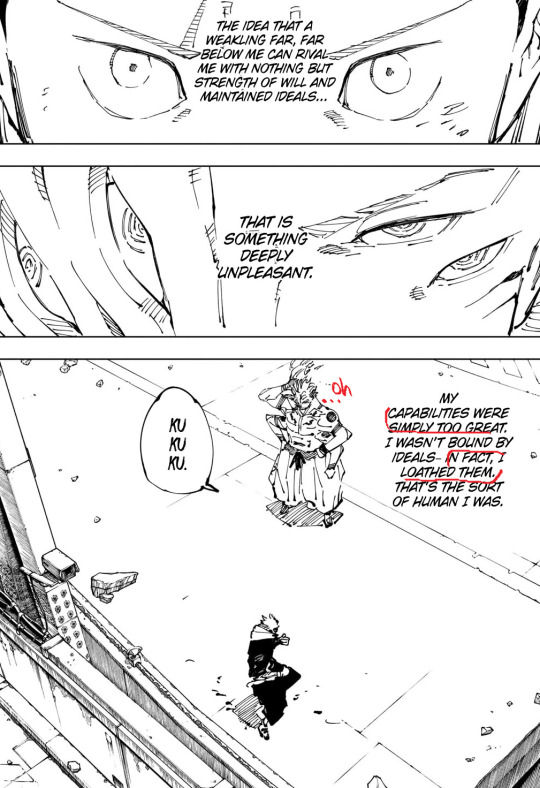
Sukuna has long lost the battle against his own hatred, mired in feelings of anger and jealousy. These emotions only fill him with disappointment and rage, fueling his desire to seek ways to cause pain and damage solely to destroy Yuji and undermine his faith
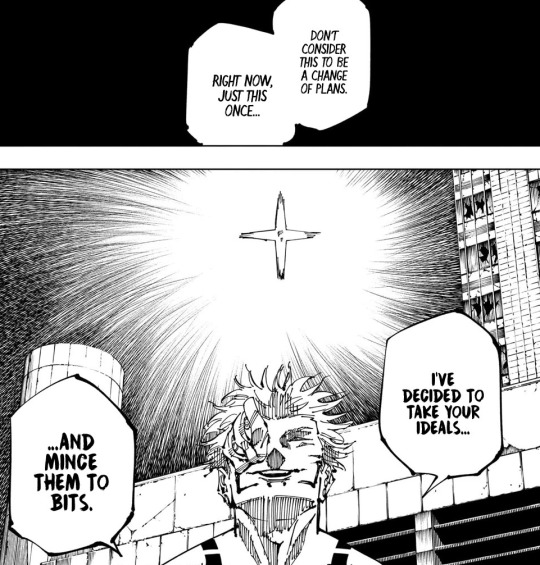
The acknowledgment that his kindness - love is genuine and unconditional seems incomprehensible to him, as if he's afraid to admit that such a thing is possible - because he was not loved and had no one. and that means he didn’t need anyone to satisfy him


Short version
He remembers his yearning for love during childhood, seeing it as a symbol of vulnerability and lack of significance. Regarding dependence on someone "stronger" as a weakness, he holds the belief that seeking affection and connections is characteristic only of the weak.
As a child, Sukuna often felt vulnerable due to his weaknesses, which made him feel chained to his flaws. This prevented him from truly loving himself and others, and he believed that only the strong deserved love, attention, and respect. Sukuna realized that true strength lies not in seeking love, but in giving it to others. However, he saw this gesture as a weakness and chose to demonstrate his strength through hatred instead of love. In battles, he "gave" his "strength " - "love "to others as a form of victory, judging the weak (including himself) as deserving of destruction. Sukuna rejected the concept of love as a dependency for the weak and meaningless for the strong. He avoids using names because he sees his past (weak) self in others, particularly Yuji, and despises himself for it.
In the past, Sukuna often felt vulnerable because of his weaknesses. It created the impression that he was shackled by a chain linking him to his flaws. This hindered him from truly "loving" himself and others, experiencing compassion ..? huh. He believed that only the strong deserved love, attention, and respect, and without strength, he was nothing.

That's why Sukuna realized that true strength lies not in the pursuit of love, but in being able to "give" it to others. He concluded that such a gesture is something only the weak need. Therefore, he decided to resort to another way of demonstrating his "strength"—using it as a tool of hatred instead of love.

Here, he seems to be contemplating a reflection that doesn't actually exist, only its silhouette - in the present, or, to be more precise, he sees himself in Yuji - in the past.
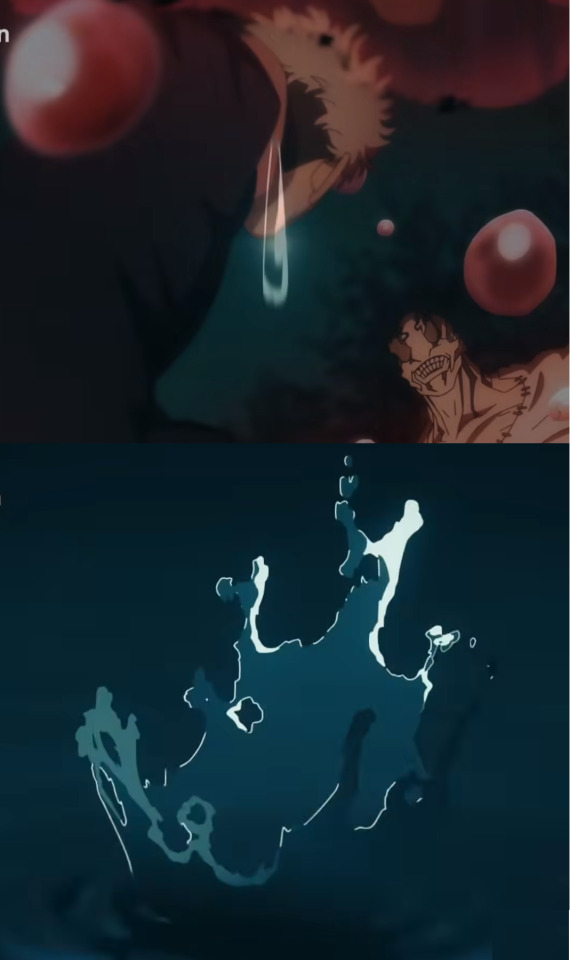
I wonder that this drop falls in Sukuna's domain, isn't it?

Sukuna began "giving" his "strength" to others in battles, seeing it as his version of "love"—an act of victory, where he acts as the judge of the battle, where the weak (Sukuna)are destroyed. And he decided to abandon the concept of love, considering it a dependency meant only for the weak and meaningless (now he's above "love" ,he is not a child, a parallel with Yuji and his treatment of him is disdainful-he recognizes himself in him)for the strong.
So he refrains from using his name because he sees himself (specifically, his past self as a child) in him - and despises himself.
Sukuna regarded strength as the sole indicator of success, and it became his driving force, but, like fuel, it only fed his inner hunger, the desire for self-destruction, rather than self?-love. He replaced strength with a sense of his former insignificance. Even being the most powerful, he couldn't stop and didn't find satisfaction, destroying himself, killing his "self" in the process, which ultimately led him to emptiness. - But the fact is that this emptiness is not of a Buddhist nature, not grounding, but self-eating
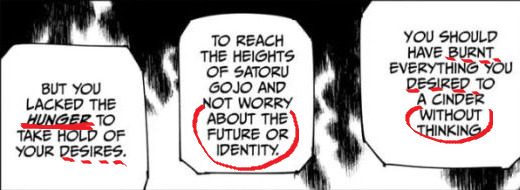

In the depths of Yuji, there is something that I am sure will turn out to be his hidden power : the ability to transform internal negative emotions into a manifestation of faith in goodness. He will not just suppress these emotions but actively engage in a struggle with them. Yuji uses hatred as a sort of weapon against hatred itself—like fighting fire with fire. He will begin to see "more than he" the idea of hatred as an inner enemy present in each of us, reflected in his own personality, in Sukuna, and in the personalities of those around him.
And thus, Yuji will strive to separate (Cut like Sukuna) his opponents from their "evil" and direct his energy only towards this "evil," which is the opposite of a Sukuna's self-hatred power ,Yuji can be viewed as a mirror reflecting Sukuna's twisted power of love.
Speculation below
The absence of parental love can create a profound void in childhood, leading to a deficiency in emotional support which, in turn, contributes to negative self-perception and attitudes toward oneself and the world. This deficiency often manifests as low self-esteem, self-hatred, and behavioral issues such as aggression or depression. Jacques Lacan's concept of the "mirror" provides insight into how parental relationships sculpt a child's self-perception and psychological development.
It is intriguing to observe how Yuji and Sukuna mirror each other's behaviors.
Identification and emulation: Individuals who lack parental figures may seek to emulate others who resonate with them or serve as role models. This behavior often stems from a desire to comprehend how to appear, feel, and act based on observed traits in others.
Search for emotional connection: People who lacked parental figures or did not receive adequate emotional connection during childhood often strive for intimate relationships with individuals who can fulfill this emotional void.
It's worth noting that characters may not fit perfectly into any one personality type due to their complexity and fantastical nature.
Yuji's identity is deeply intertwined with television. Gege's narrative underscores that he "grew up on television," suggesting that this medium became a surrogate for parental figures and filled the emotional void in his life. His enthusiasm for parodies and karaoke, venues where he could interact with others, reflects his ambiguous sense of individuality, likely influenced by television as his primary source of inspiration and behavioral model. Additionally, his emotionally reserved grandfather deprived him of necessary support during childhood. - if unfounded then Yuji INFJ -INFJs are known as chameleons, adapting to different situations. This clarifies why Yuuji excels in collaborative combat and absorbs lessons from others—he's like a sponge.
Sukuna's depiction as a petulant child reflects emotional immaturity and egocentrism commonly associated with unresolved childhood traumas or deficiencies in parental nurturing. His reactions and demeanor echo characteristics typical of children: egocentrism, emotional volatility, rebellion, and disobedience. His unpredictable behavior mirrors the emotional turbulence of a child grappling with feelings of abandonment or neglect, particularly evident in situations beyond his control or comprehension. - if unfounded then Sukuna INTJ
INFJ : "I may not always understand the intricacies of your emotions on an intellectual level, but I can feel them deeply.It might not intrigue you cold mind , but it brings warmth to your heart." Breathing life into your being."

INTJ: "Your natural stands as an enigma within my ordered world. Yet, I find myself drawn to this anomaly, stirring within me something beyond rational comprehension. This connection, however unconventional, holds a fascination that I cannot ignore."
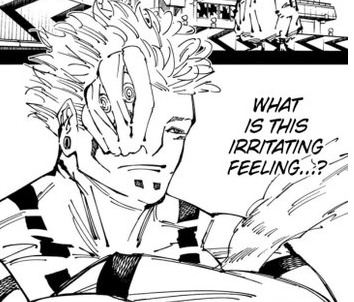
One feels the other thinks - but they are one -connection between Yuji and Sukuna, suggesting that despite their apparent differences, there is a symbiotic relationship between them. This mean that they influence each other in profound ways, with Yuji's emotional sensitivity complementing Sukuna's strategic thinking, or vice versa. It indicates that their identities are intertwined on a fundamental level, even though they may manifest differently in terms of behavior and personality.
Nevertheless, Sukuna experiences a transformative moment when he acknowledges and embraces the profound love emanating from Yuji. This revelation serves as a form of "enlightenment" or "rebirth," illuminating a path within the darkness of his existence. This is the first time Sukuna encounters unconditional love. For him, it signifies liberation from hidden motives, such as the desire to use others in his childish power games ("me versus you," "who's superior," etc.), simply to kill time. Now, he avoids manipulations he once considered normal but which Yuji interprets as a craving for attention. Yuji doesn't value "power," leading Sukuna to the paradoxical conclusion that he's unloved - the only thing he ever desired. He realizes his past actions were merely theatrics, where he played the leading role, but now, meeting Yuji, everything changes. Yuji doesn't engage in this game, refusing to succumb to the spectacle of death for emptiness' sake. This moment underscores parental resilience, selfless guidance, and dedication to the greater good.
This realization is especially poignant following Sukuna's unsuccessful attempts to break Yuji. Yuji's unwavering loyalty and resilience, directed not towards himself, exemplify a depth of love Sukuna has never encountered. Sukuna's inability to avert his gaze from Yuji, despite the accompanying anguish, underscores his inner turmoil. This revelation challenges his preconceived notions, exposes internal conflicts, and highlights emotional vacancy, reflecting the difficulty he faces in embracing newfound emotions and comprehending the true essence of love and loyalty.
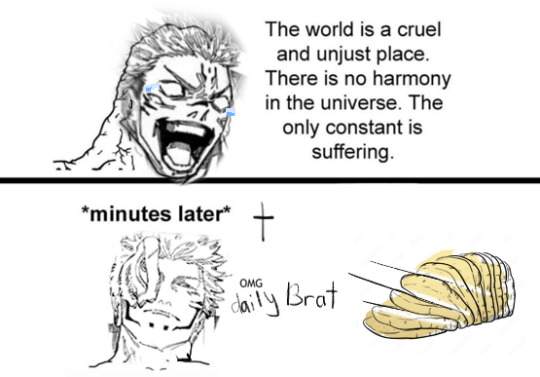
#jjk meta#ryomen sukuna#jujutsu kaisen#jujutsu kaisen theory#jujutsu kaisen analysis#jjk#jujutsu kaisne spoiler#yuji itadori#jjk manga#manga#anime#jjk spoiler#jjk analysis#jjk 255#jjk 256#sukuita
139 notes
·
View notes
Text
Yeah… this is the face of disgust
It’s over ya’ll
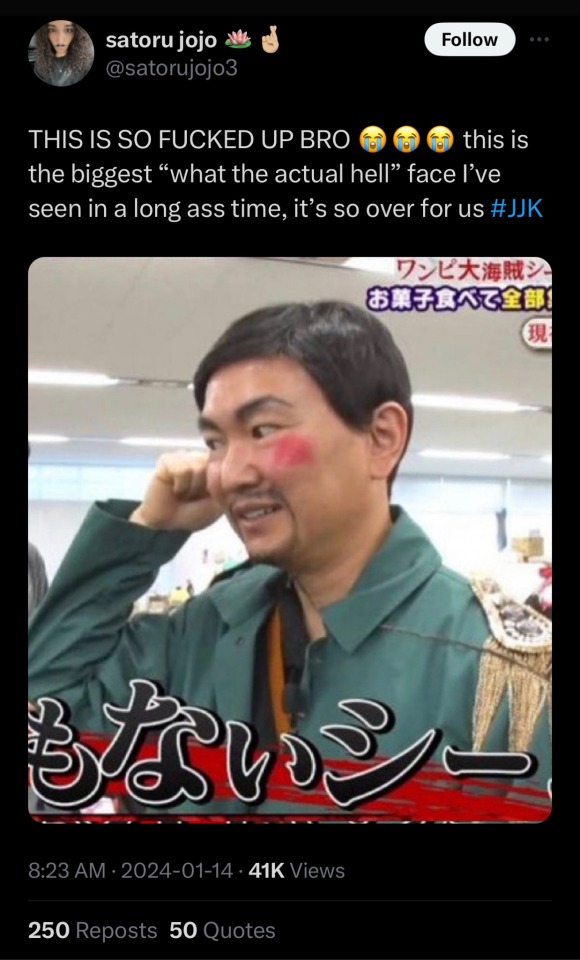
[For context this is a TV host’s reaction to JJK’s editor showing him an incoming “shocking” chapter.]
I TOLD YA’LL WE CAN’T TRUST THAT MAN G*GE
#it’s nanami coming back and being possessed by sukuna btw#jjk#jujutsu kaisen#jujutsu kaisen spoilers#jjk manga#jujutsu kaisen fandom#gojo#gojo satoru#jjk theory#jjk thoughts#jjk yuji#yuji itadori#ryomen sukuna#sukuna#yuta okkotsu#kenjaku#jujutsu kaisen ino#culling games#culling game arc
169 notes
·
View notes
Text
Yuji's immense Potential to beat Sukuna
i noticed something within reading the manga, and the most recent chapter just gave me confirmation that my theory might actually be true.
JJK SPOILER WARNING CH238!
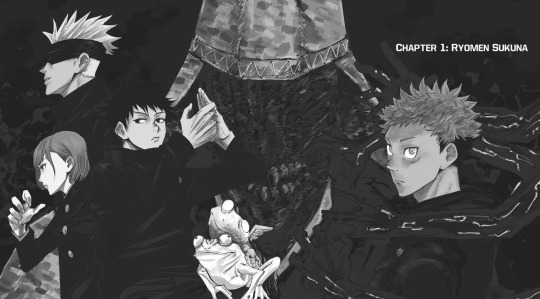
so, let's start off with the cover of chapter one. gege drew the marks from sukuna on megumi's frog, forshadowing that sukuna will take over megumi.
but we also see those 4 arms around yuji.. no doubt, those are sukuna's arms, as it was already mentioned by gojo in the beginning that sukuna has 4 arms. but keep the appereance, especially the nails, in mind..
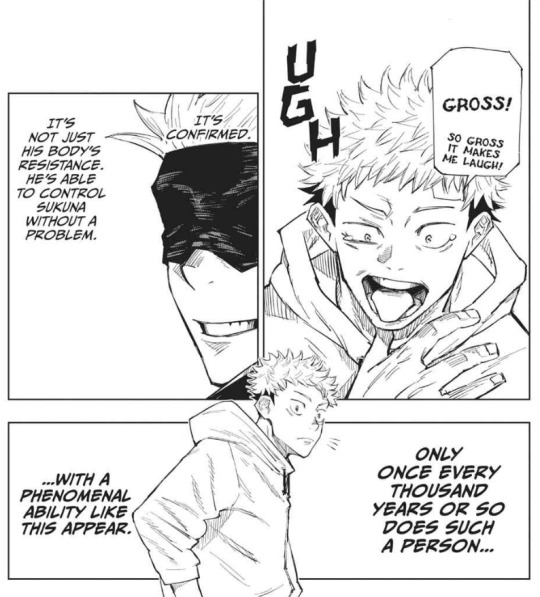
as gojo assumes here, yuji is a one in a million people who can be a vessel for sukuna, even better that yuji manages to control sukuna. but.. what about megumi? appereantly there are two persons in a thousand years that are able to maintain sukuna? i don't think so, or it, that must be a really big coincidence.
we already know that kenjaku's probarbly the reason why yuji is so strong, yet we don't know if kenjaku created yuji on purpose for a cage for sukuna. probarbly not, since gege once mentioned that kenjaku just did it for fun!
(kenjaku was going up and down so yuji could go left and right lmao)

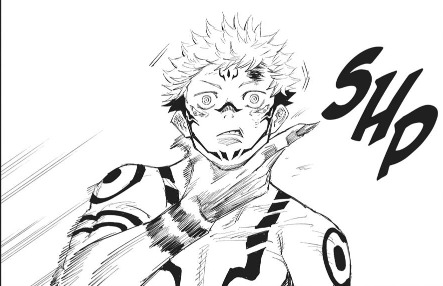
so? notice something? remember the nails from sukuna's arms on the cover from the first chapter? i wonder where these long black nails did come from..
i also think it's really interesting how the hand with the nails is grabbing sukuna's neck, indicating that because of yuji he grew some black long stilettos lmaoo xD

i'd like to think that sukuna is somehow "borrowing" yuji's strength, as we see here beautifully illustrated: sukuna whips off the curse with the hand with the long nails, not the other.

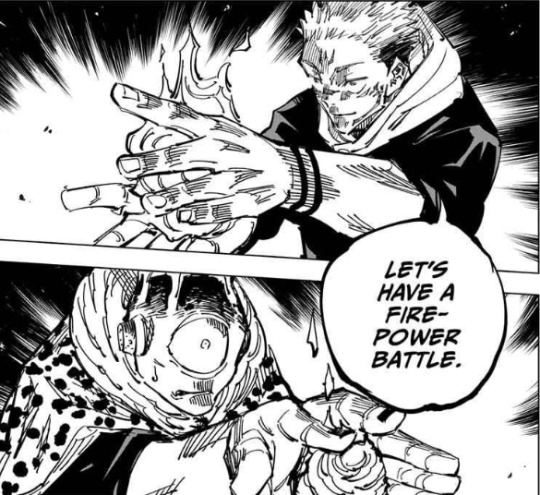
and also, the interesting thing is that as soon as sukuna gains full control over yuji's body and uses his own technique, the black nails are GONE.
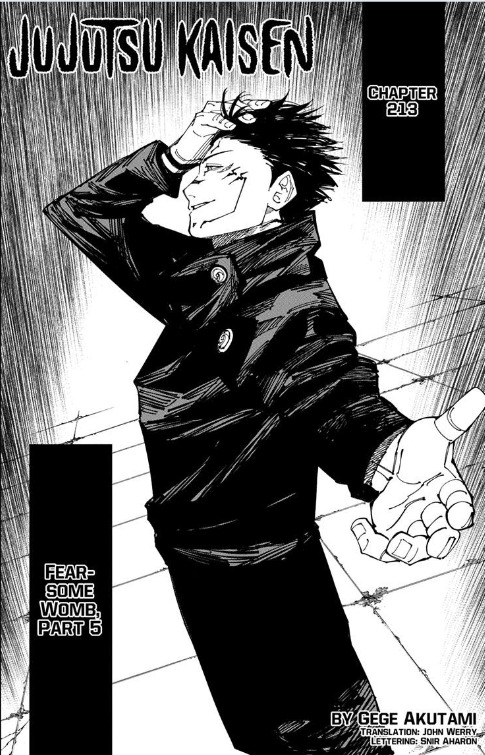

and as we see, as soon as sukuna isn't trapped in yuji's body no more, the black nails also never showed up anymore. even as sukuna reaches his original form, the black nails aren't there..
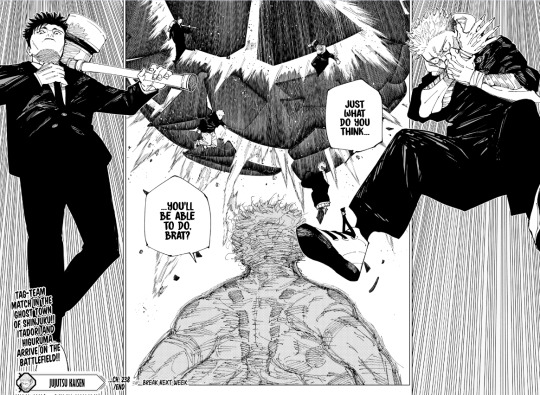

YUJI IS COOKING SOMETHING Y'ALL AND I'M EXCITED AS HELL
#thanks gege for letting yuji finna have his mc moment#i'm not ready y'all#jjk#jujutsu kaisen#yuji itadori#itadori yuji#jujutsu itadori#jjk itadori#itadori x reader#itadori x you#yuuji#itadori yuuji#jjk analysis#jjk theory#jjk spoilers#jjk manga#jjk anime#jjk headcanons#sukuna#ryomen sukuna#sukuna ryomen#the fallen#king of curses#jjk ch238
201 notes
·
View notes
Text
Maki has the potential to be the ultimate counter to Sukuna right now. Here's how she might play a big role in his defeat.
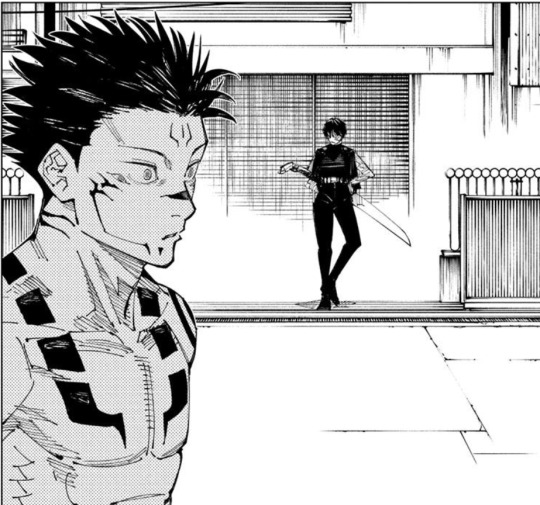
For ages, I thought Maki was a terrible match up for Sukuna, but after rereading some of the manga, I realised how she could counter almost all of his abilities if the good guys played their card right.
How she can seriously hurt Sukuna:
Sukunas reversed curse technique is so broken that there is almost no way to really damage him, he has more cursed energy than anyone else in the verse and since he was refreshed by incarnating the chances of him running out are pretty tiny.
But there is one thing we know reversed curse technique can't heal. Damage to the soul

It's stated twice in the manga that Sukuna can't heal Mahitos Idle Transfiguration, a technique that attacks the soul directly.
And Maki just so happens to have a weapon that can cut the soul of its target, in fact this is even pointed out in the manga.

Since Gege points this out himself, I feel like there is some real grounds to say Maki might be able to really damage Sukuna.
How Maki would survive Dismantle and Cleave.
Other than the fact we see characters like Kusakabe, Higaruma and Yuji taking hits from dismantle and cleave, (all characters that should be way less durable than Maki).
I think there's solid evidence that Maki could even doge these attacks before they hit her, even though the slashes are invisible we see Mahoraga deflect one, meaning they do travel to hit their target and could be dodged.
How would Maki see them coming?
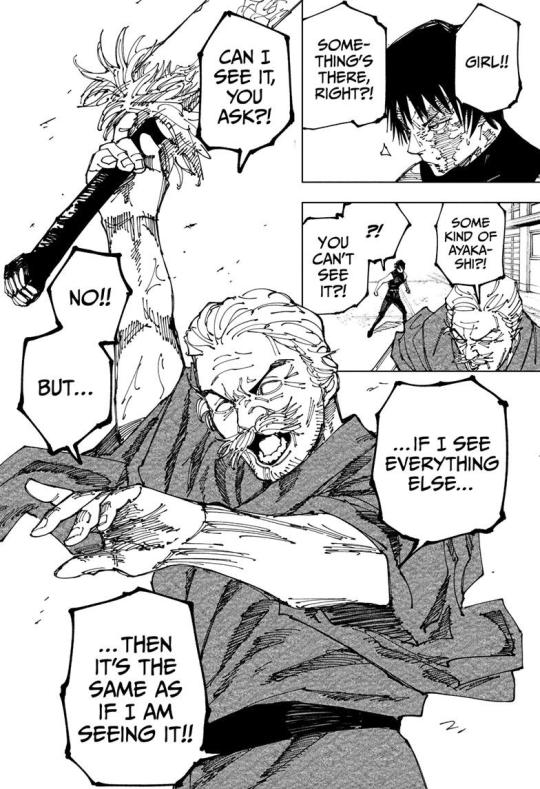
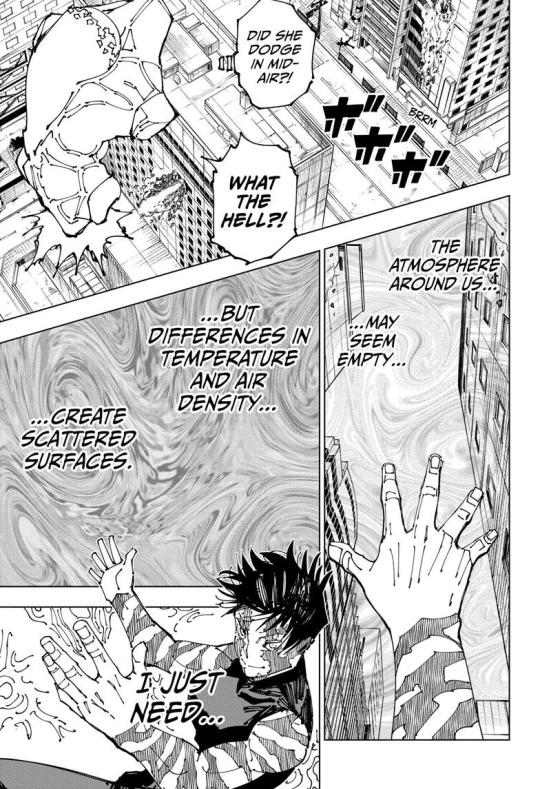
It's shown that characters like Maki, Toji and Daido can see invisible things by seeing how they affect the space around them, so her seeing Sukunas slashes makes sense.
How would she survive Sukunas domain?
Since Sukunas domain target inanimate objects with no cursed energy as well as sorcerer's, it's one of the few that Maki isn't immune too, so how would she survive?
Well there is one thing we've seen able to dispel domain expansions and can be used freely only by someone like Maki.
The Inverted Spear of Heaven!
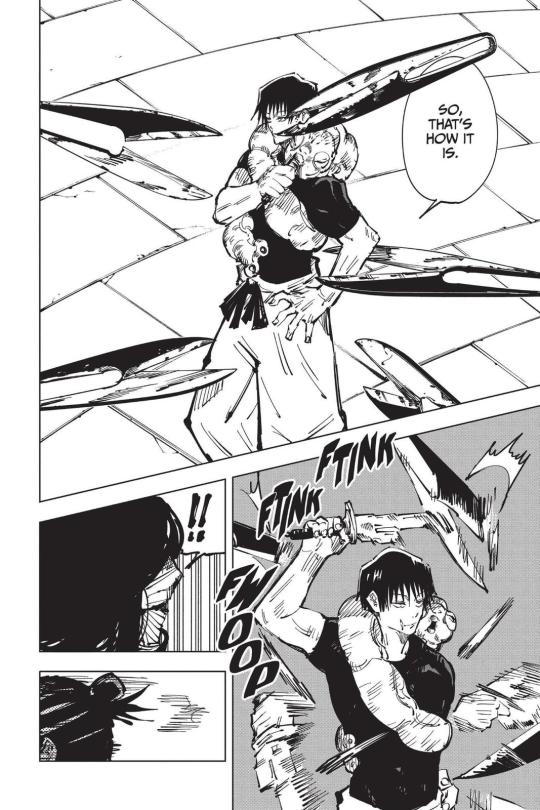
Toji dispels this cursed spirit's innate domain by bringing out the Inverted Spear.
bUt goJO DesTrOyeD iT
No, Tengen says Gojo either sealed it or destroyed it, we don't know which
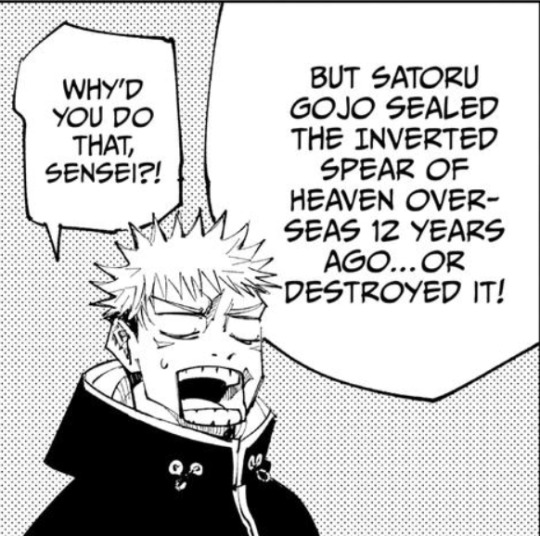
While Gojo definitely wouldn't want the higher ups to know about a weapon that could counter him, I don't think he would destroy something as unique and valuable as the spear. He probably hid it somewhere, only he could get it.

In the time between Gojo getting unsealed and his fight with Sukuna, I think it's fully possible he would retrieve the spear and give it to Maki, seeing how she had awakened and knowing how well Toji used it.
If he did give it to her, and Sukuna tries to open his domain, it would collapse as long as the blade is exposed to it.
Finally, how would she get close enough to strike?
As much as I love Maki, she is not on Sukuna's level of speed and in a one on one fight she would never get close enough to hit him, but if he was distracted by a bigger target, then she could land a sneak attack since she's basically undetectable.
And who's a better distraction then Yuta Okkotsu, he is constantly described as having overwhelming cursed energy and with Rika manifested that's only going to be more extreme.
Sukuna doesn't have the Six Eyes and remember Gojo was the only person to ever notice Toji when he was standing behind him, I think that while Yuta holds off Sukuna there is a perfect opportunity for Maki to land a clean hit with the Soul Split Katana.
Maki is the only heavy hitter that's been completely absent from the Sukuna fight so far, and I really hope Gege uses her to her full potential here, since he loves Toji comparisons a parallel to this shot would be awesome to see
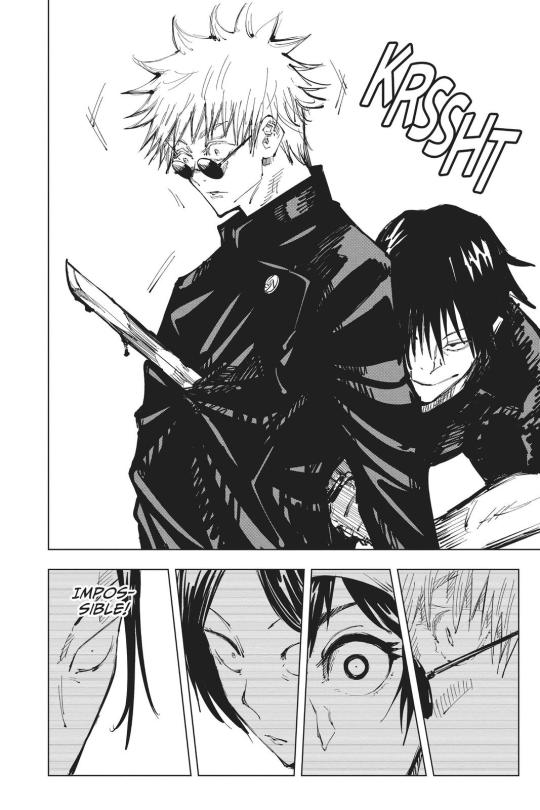
I don't think Maki will be the one to defeat Sukuna, that has to be Yuji, but I hope she gets to at least do some serious damage that lets Yuji have an actual fighting chance.
Of course Gege could pull some bullshit "I had a perfect counter to this from 1000 Years ago" again, but I hope he doesn't
#jujutsu kaisen#jujutsu kaisen theory#jujutsu kaisen prediction#jjk#jjk theory#jjk theories#jjk maki#maki zenin#maki#jujutsu kaisen maki#jujutsu kaisen analysis#sukuna#ryomen sukuna#jujustu kaisen manga#jjk manga spoilers#jjk manga#jujutsu kaisen spoilers
128 notes
·
View notes
Text
Spoiler warning- Chapter 257 of JJK
"bro's been a hater since day 1 blablabla considering the fact that he 'ate' his twin" However, he indeed, did not do that consciously as a malicious intent of survival and/or ending any competition. In fact, he didn't even 'eat' him like how people eat food.
What happened with the Ryomen twins is a case of the 'Vanishing Twin syndrome'. If one of the two foetus fails to develop properly it gets absorbed by the other twin foetus and the mother's body. Often the underdeveloped twin gets partially absorbed by the developed twin which often leads to appearance of extra appendages on the living twin.
Apparently shortage of proper nutrition to the mother could serve as a potential reason in causing one foetus to not develop properly and therefore get absorbed by the other.
Considering the Heian Era (1000+ years ago), medical science was probably not that advanced and therefore when a child was born with 4 hands and 4 feet, 4 eyes as well, it's pretty obvious that people called it a monster and despised it.
Therefore it is highly possible that Sukuna was fed the idea that he 'ate' his sibling inside his mother's womb, from a very young age(the reason why he said 'ate' in a malicious tone). There's no way a foetus has any memory of what they did inside the womb. He was probably told that he has always been a sinful cursed child since day one, and of course no body wanted him.
Idk judge me for it but considering everything he could have gone through as a child, INCLUDING that fact that he had immense cursed energy which solidified the people's view on him being a demonic creature, he really might turn out to have one of the saddest backstories in the series. Toji was at least regarded a human, albeit not one with Cursed energy. As for Sukuna, I doubt the people around him even considered him one.
#jjk 257#jujutsu kaisen#jujutsu kaisen spoilers#sukuna jjk#sukuna#sukuna ryomen#ryoumen sukuna#jjk sukuna#jujutsu kaisen sukuna#yuji itadori#jin itadori#anime and manga#manga#manga spoilers#fan theory
81 notes
·
View notes
Text
Gege Prefers Deception, and So Does Sukuna
Before, I predicted Sukuna and Maki's dynamic revealed in 253; I also argued that Sukuna would get serious versus Maki. Now, I want to examine what a serious fight for Sukuna looks like.
TLDR: When holding back, Sukuna plays with his food and allows his opponents handicaps. When serious, Sukuna plays dirty, hides his hand, and uses tricks to deceive his opponent to create more advantages for himself. Both Gojo and Maki are the only ones to push Sukuna to use underhanded tactics to best them.
Introduction
Holding back for Sukuna means being less creative and resourceful for the most part. In 253 and 252, Sukuna went back to using underhanded tactics to win a fight. Here's a rundown of how Sukuna fought the rest of the cast:
He faced Kashimo's blast and gave him a warning before using the world dismantle:
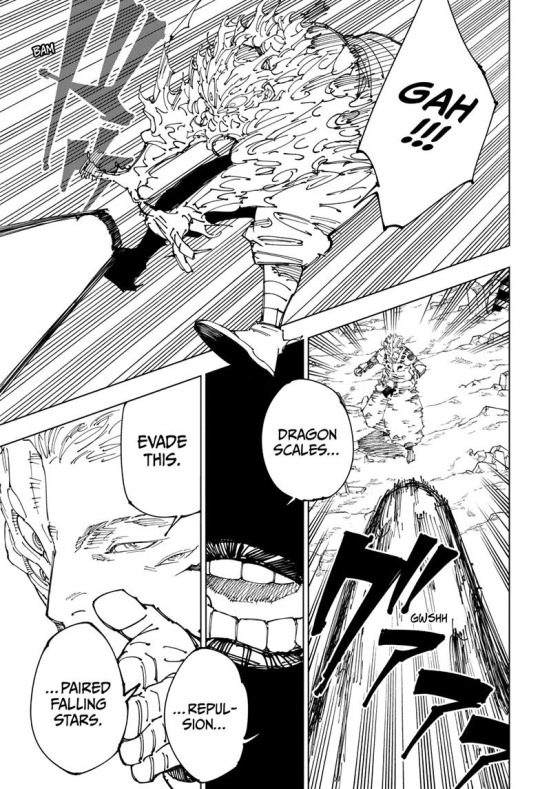
Sukuna stood out in the open when everyone gathered to jump him. Choso was the first victim to get speed bltized.
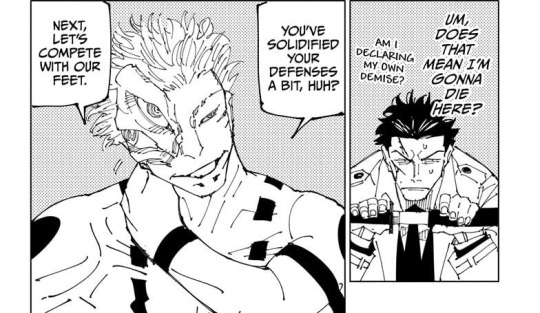
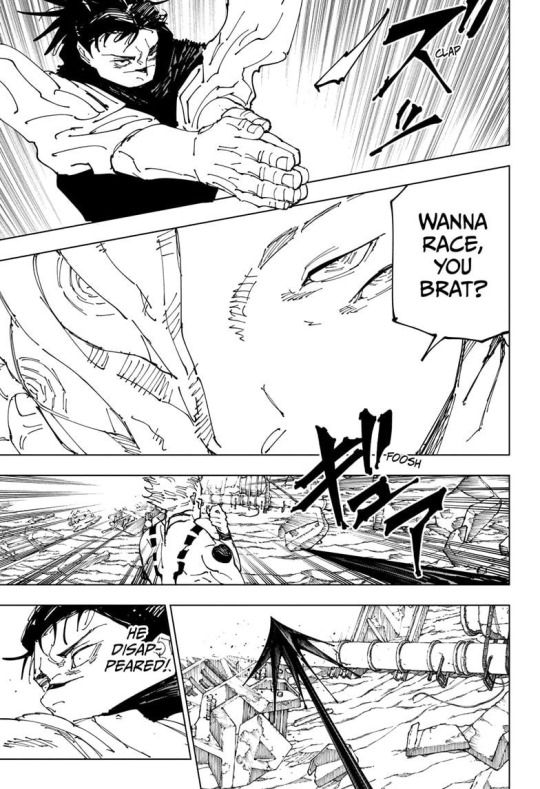
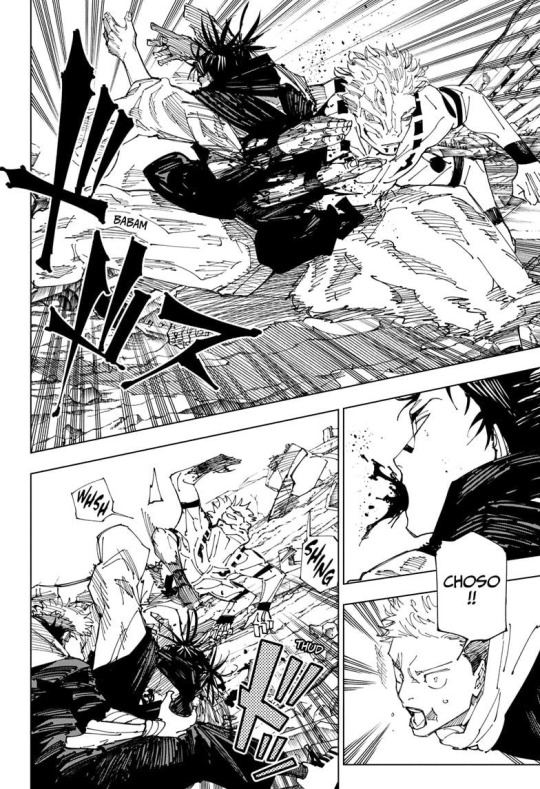
After isolating Higuruma, Sukuna was impressed by his domain amplification and reverted to using world dismantle. He then demanded that Higuruma heal himself to keep fighting while standing out in the open.

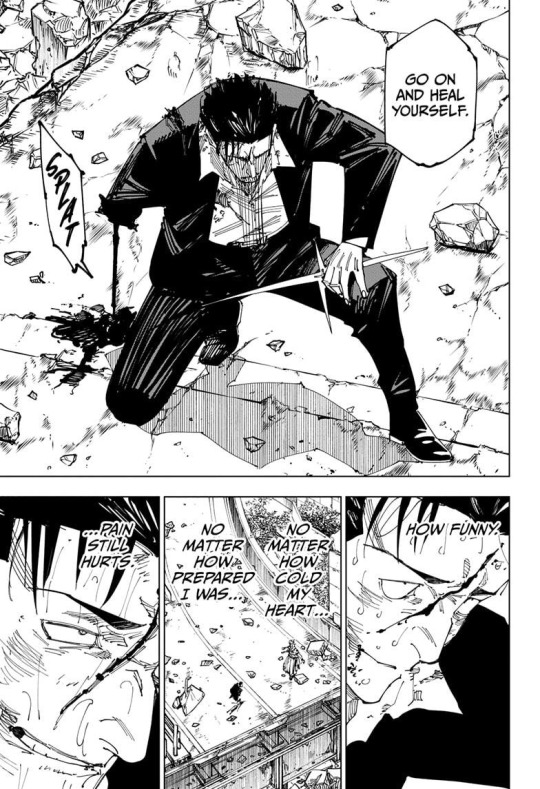
Against Yuta, Sukuna stood with an open stance before both him and Rika. I acknowledge that for most of their fight, Sukuna was trapped in Yuta's domain and had few to zero methods of deception available while in the barrier. Here, I focus on Sukuna's demeanor at the beginning because it was equal footing before Yuta's domain expansion.


In all of these fights, Sukuna exposed himself directly to his targets while taunting them. Against Kashimo, Higuruma, Yuji, and Yuta, he was mostly open and obvious with his attacks. He didn't try to hide anything and would even give warnings as a taunt (Kashimo and Higuruma).
A Sneaky Devil
Against Gojo and Maki, Sukuna hides his hands to catch them both off guard.


Sukuna fakes out Gojo by pretending to aim at him, but instead targets the building and attempts to sneak Gojo while he's distracted.

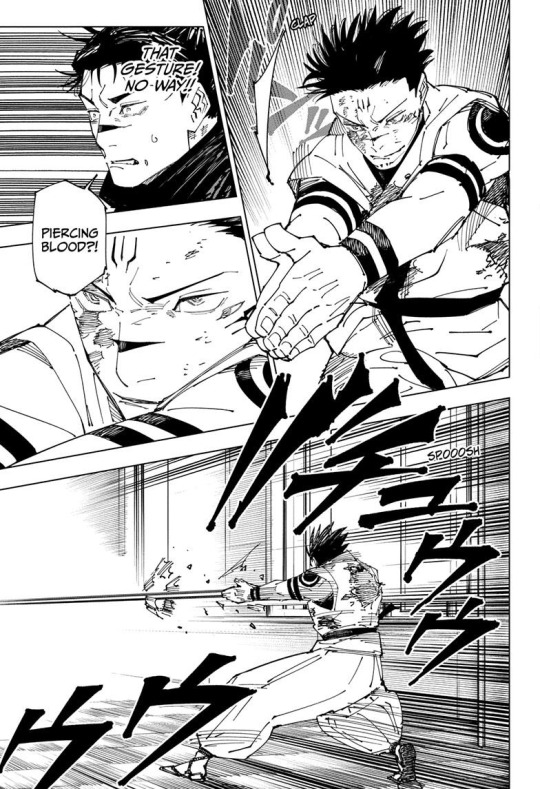
Sukuna used the fire hydrant to create a cover for Mahoraga and himself while he used his pseudo-piercing blood.
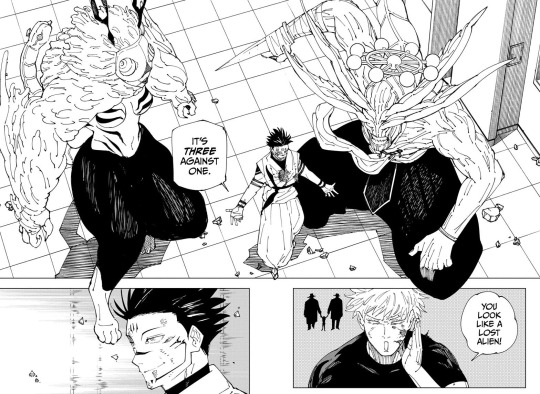
Of course, Sukuna also prepared a three vs. one against Gojo, increasing his chances even more against him. Mahoraga and Agito allowed Sukuna to hide in the shadows while Maho prepared an attack that could counter limitless.



After Maki dodged his first dismantle and overpowered him, Sukuna immediately switched back to underhanded tactics. He used the wall to create a cover for himself to fire a world dismantle at Maki, whose vision and hearing was obscured by his distraction. Given the narrator's words that Sukuna had been looking forward to Maki the most after Gojo's defeat, his sudden switch up in attitude makes sense. When Maki showed herself, Sukuna reverted back to the same tactics he used on Gojo, which juxtapose his attitude towards the others. Sukuna switched from an open and exposed demeaner to suddenly obscuring himself behind debris; this is so sudden that Sukuna's purposeful concealment of his technique was one of the main things people talked about after 252 was released. I do not think most people understood the context that I am shaping, but the idea of Sukuna hiding his own hand was jarring nonetheless.
To speak on the narrative, Gege had been writing Sukuna as a cocky fighter for weeks, and in 252 that changed. I do not think many understand that Sukuna reverted back to tactics he used against Gojo, and instead have mostly ignored his change in tactics. My argument and my evidence correlate to Uraume's warning in 252.


Sukuna used more underhanded fighting tactics against only Gojo and Maki; thus I argue that a serious Sukuna is one who does not play fair. An opponent that pushes Sukuna forces him to rely on deception and trickery in order to gain an upper hand against them in an otherwise difficult matchup. Sukuna, at his most serious, is a cheater.
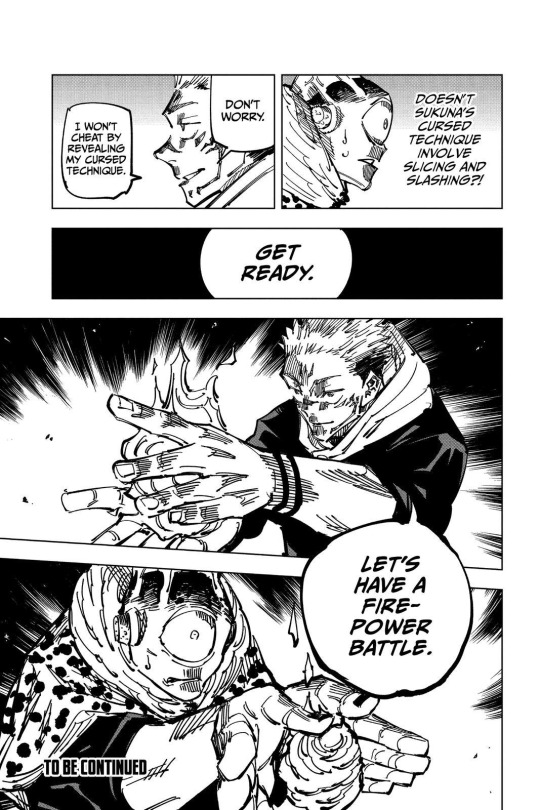
"I won't cheat by revealing my cursed technique."
When Sukuna's taunting his opponent by leaving himself open to their attacks, he's playing with his food. When Sukuna has to get serious, he's an unapologetic cheater.
A General Retrospection
Gojo also used deceptive tactics in the fight against Sukuna. Deception seems to be the main aspect of Gege's fighting choreography. The Jumpjutsu Kaisen meme has merit: characters often group against lone enemies; they often use sneak attacks when possible; and fights can end by outsmarting the enemy, not necessarily overpowering them. While calculating Mahoraga's adaption, in a race against time, Gojo also used the pillar the same way Sukuna used the car against Maki. He set a trap, hid, and attempted to take Sukuna off guard.
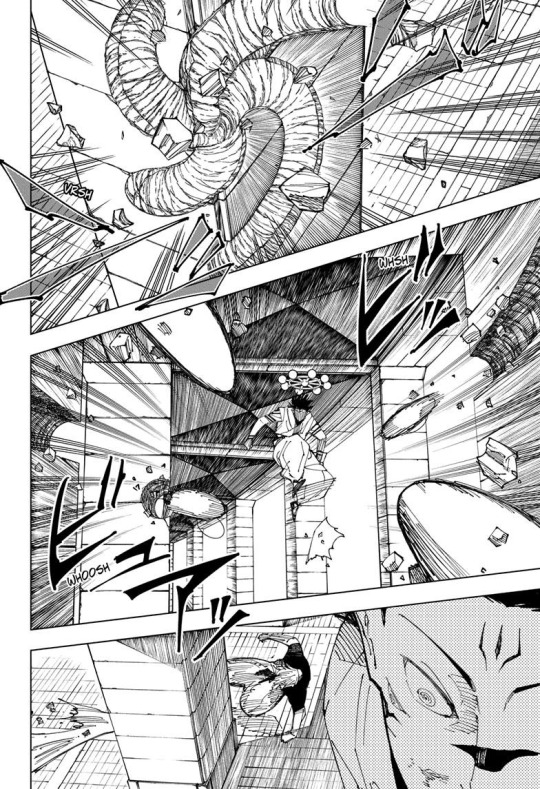


Sukuna used the cars nearby to hide and shoot a dismantle at Maki, but she still dodged it. Even then, the car exploded and knocked Maki away and Sukuna used that momentum to catch her in a cleave.
Both Gojo and Sukuna relied on strategy and their power to win; for most competent fighters in jjk, both of these qualities make or break a fight. Though Sukuna's understood to be a patient and strategic person (how he played both Yuji and Megumi), he stopped being himself and became arrogant in front of everyone else.
I've argued about Sukuna reverting to unfair tactics to win against Gojo and Maki, but what did she do? Just like any other competent fighter, Maki also used deception against Sukuna. For one, Maki began her fight with a sneak attack directly to Sukuna's heart. After Sukuna cleaved her, she reappeared while he was distracted and rushed him. While he was unable to defend himself midair, Maki quickly used a pillar against him to send a shockwave that launched him across the room.


Perhaps it was because his cleave apparently did little to no damage against her, but this attack was the final straw for Sukuna. After this, he finally admitted his motivations for fighting Maki.
Uraume's comments may hint at why Sukuna's speed suddenly ramped up against Maki after he entered a state of ecstasy. Maki survived his attacks without much of a scratch all the way up until his final speed spike that chapter. Something that will hopefully be revealed soon may provide an understanding for his apparent escalation in speed throughout their fight. At the beginning of the chapter, Maki dodged a dismantle directly to the face. Just after the car exploded, Sukuna was already inside the building and coming around the corner from Maki. When he was caught off guard, she was able attack him from two different angles within an instant. The face grab was yet another spike in Sukuna's speed.
Sukuna suddenly dropped the sneaky attacks and went straight for Maki's face and a direct punch. It's like he suddenly lost his patience for a strategic battle and went berserk. He hasn't ever done that until now. Even against Mahoraga and Jogo, when he was his most wild and unserious, it was an aura of fun. Against Maki, it was like madness.
It's safe to say a serious Sukuna is a dirty fighter more than anything else. I wonder how black box plays into this interesting trait. Sukuna's escalation of his own speed, and forgoing healing, hint that he may be close to revealing his real technique soon. Last time I tried to predict this, he hit a black flash. I knew something big was coming, it just wasn't the right big one. I don't wanna be wrong about which chapter it will happen, but I think it will be soon.
Notes:
I like that Gege writes JJK's characters to rely on strategy more than overpowering the enemy. It can make some fights messy, but I think it works great for the most part.
Who would make Sukuna use his full CT? Maki.
Since Maki's arc began, Gege always begins her big fights with two prerequisites: she starts off with confidence against her opponent, but then they overwhelm her. At the end of the chapter, she's seemingly killed off. She always gets back up and fights even harder than before after an awakening of some sort.
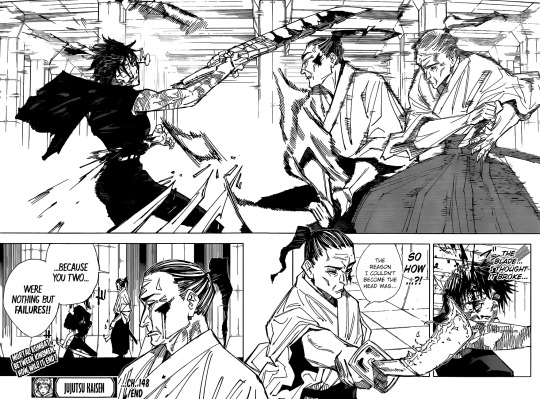
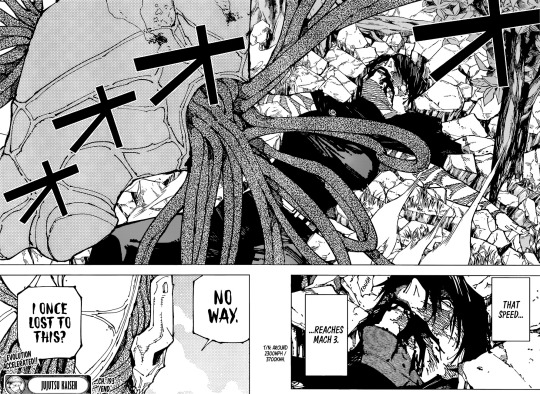
#jjk#jjk manga#jjk 253#jjk theory#maki zenin#ryomen sukuna#higuruma hiromi#yuta okkotsu#yuji itadori#gojo satoru
81 notes
·
View notes
Text
Funniest thing Gege could use Higuruma's domain for in the next chapter is to use it to lore drop the biggest revelation about Sukuna's past or smth. Just saying.
#jjk#jujutsu kaisen#ryomen sukuna#higuruma hiromi#yuji itadori#uraume#hakari kinji#this is my one fear#ever since jjk236 it feels like all bets are off at this point#and if a long time theory gets confirmed like this what then#jjk 239#itadori yuuji#itadori yuji#scarlet speaks
246 notes
·
View notes
Text
Woke up today to some wild jjk leaks and it turns out Gege is hitting that Hamlet type beat with some uncle-nephew drama with Sukuna and Yuuji? Like what?

By the gods Kenjaku really be messing with that family tree. And this still doesn't explain why Itadori Wasuke looks so much like Sukuna? Like with Jin and Yuuji it makes sense now...but what about grandpadori? Something must've been up with that family even before the Kenjaku and his shenanigans.
It truly is our Jujutsu Kaisen! Amen.
#It makes Sukuna's problem with Yuuji a lot clearer#If a creepy brain fucked my brother and had a designer baby for putting me in jail and that kid keeps smacking me with black flashes...#and consistently raining on my murder parade....Hell I'd be a little mad too#Kenjaku is the GOAT though#I love that crazy evil brain#Once again asking Gege to drop Keeping Up With The Itadoris#JJK 257#jjk manga spoilers#jjk manga leaks#Ryomen Sukuna#Itadori Yuuji#Itadori Jin#Jin my beloved I know your dick game must have been wild twin or not cos you got Kenjaku to commit hard#Jujutsu Kaisen#JJK#But for real though nani the fuck?#Like twin theory was much better but Gege decided to that the family tree wasn't convoluted enough lmao#Kenjaku
81 notes
·
View notes
Text
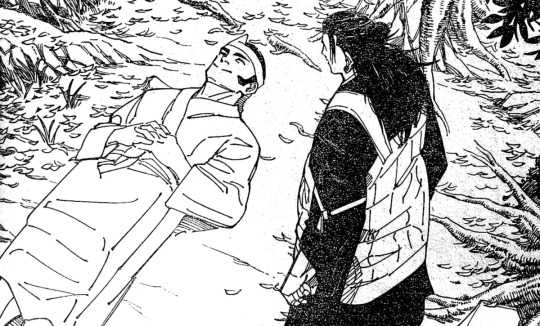
The Death of Kenjaku
So I was planning to write this meta the week that Kenjaku died, but decided to delay until we got full confirmation of his death. Something I didn't believe in even after Kenjaku passed the merger onto Sukuna. However, watching this video about death in Jujutsu Kaisen inspired me to finish this post. Not because I disagree with anything the YouTuber is saying, but because they can speculate on the meaning of so many deaths in Jujutsu Kaisen but can't find the meaning in Kenjaku's sudden death.
This has led me to speculate why Gege made the choice to kill Kenjaku in the way that he did. What meaning is there in Kenjaku's abrupt and unsatisfying death?
Who is Kenjaku?
The first step in understanding Kenjaku's death is of course understanding how he lived. We actually know incredibly little about Kenjaku's character by design. Despite the fact he's literally in Geto's body, he's not meant to have sympathetic or human motivations to his actions (though hold onto that "human motivation" in your head for a moment). No flashback sequence shows the audience why this guy is the way he is, no single event seems to have driven him to do what he did.
This is what we know about Kenjaku in brief. He is a sorcerer who is over a thousand years old who was around in Sukuna's day. He once had a friendship with Tengen, but found her original self boring and unambitious. He also contrasts heavily with Tengen, who lives outside of humanity, because he has lived among humanity for 1,000 years. One of those lifetimes was Noritoshi Kamo who violated a woman and conducted heinous experiments. He produced ten children in his one thousand years, the nine death painting siblings and Yuji Itadori. He considers the first children boring, because human and curse hybrids turned out too normal.
He also partially blames himself for how boring they are, because he can't create anything that will exceed his expectations, the only thing that can exceed his expectations is born in chaos. He spent a thousand years organizing the culling games, and wants to use the games to create a merger, because he thinks creating a merger between Tengen and Humanity will create something entirely new and interesting. He also believes the way towards the future lies in further optimizing cursed energy, not in breaking away from it the way Yuki Tsukumo tried to do and Maki has.
The only people whose word we have on Kenjaku's motivations are Kenjaku himself, and Tengen's word and Tengen themselves who claims to not know what goes on in the human heart.

From all of the above Kenjaku seems to be a shallow character who's motivations can be summed up as "because I can" and "I want to see what happens." This shallowness is intentional however, as Gege who once praised the minimalist storytelling of Nasu and Evangelion likes to pick and choose what crumbs of backstory he gives out for his characters. We've never gotten any exposition on the Gojo clan, but we have an entire chapter about Takaba's failed career as a stand-up comic. This isn't a judgement of good or bad writing, this is just how Gege writes as minimalist as possible. This is in line with how Gege writes the ancient sorcerers as well, they are all much more shallow driven by instinct or Freudian Id (I desire) rather than the higher reasoning of modern-day sorcerers. Takaba uses comedy as a means of communication and bridging the gaps between people, Higuruma's backstory is the critique of the modern day justice system.
Ishigori apparently lived a satisfying life where he was succesful and had good women, but that wasn't enough so he wants to get into a fight with Yuta to satisfy his hunger and feel like he's eaten desert.
It sounds shallow when I summarize it in text, but in the context of the fight with Yuta, it's a challenge for Yuta who for the most part only cares about his loved ones and sees the world through his love goggles to be more selfish and fight for his own desires. It's also reflective of a more basic and instinctual kind of thinking, as opposed to the higher reasoning and logic that modern-day sorcerers apply.
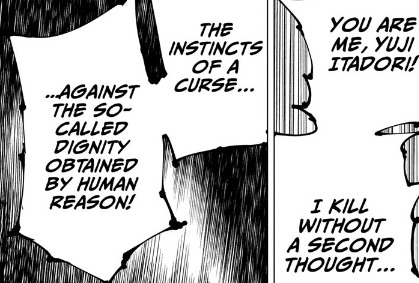
I'm keeping most of this first part to text for this reason, like go back and read the fight with Ishigori and Yuta. If I summarize Ishigori's character reasoning out of context it sounds stupid, but read the fight and it works because it's ID (I Desire) vs. Yuta's superego in not only having to collect points to help rescue Tsumiki, find a way to protect all the innocent people in the Culling Games, and also collect enough points to take on Kenjaku himself so Gojo won't have to. Meanwhile Ishigori's just fighting to get some of that sweet desert, the shallow works in contrast to the more layered motivations of our heroes.
Kenjaku is a shallow archetype fighting to satisfy his baser impulses (in his case curiosity) in comparison to the main characters who are fighting for more complicated reasons and often people besides themselves.
The question then becomes what archetype is Kenjaku. In that case answering who Kenjaku is is quite simple.
Kenjaku is a clown.
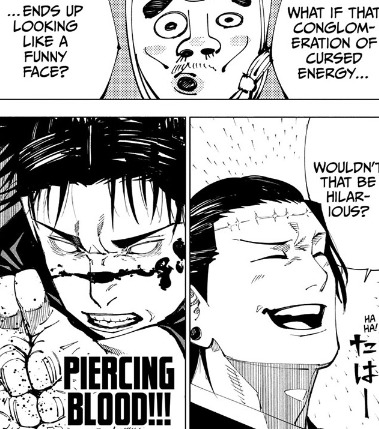
It might be more accurate to say that Kenjaku embodies what's commonly known as the "trickster archetype" but I'mma go with clown.
The most obvious example of a clown villain is what most consider the joker to be, that is a silly little clown man who challenges the straight faced and grim batman and sews chaos where Batman attempts to establish law and order in Gotham and make the city into a better place.
From the book Batman and Psychology:
More than any other villains, the Joker and Two-face reflect Batman himself as funhouse distortions, converses of who and what he is. The laughing, jesting, brightly colored Joker contrasts with grim, dark Batman. The Joker is the Joker. No alter ego. The film's opening bank robbery shows him wearing a clown mask over clown makeup, Under the surface there's only more Joker. He gives no history except inconsistent lies. When he finally considers the impact of his demand Batman unmask, he retracts the threat and demands that Batman's identity remain undisclosed. He wants a batman who has no other self, a Dark Knight whose only deeper layer is further darkness.
Is there a better descriptor for Kenjaku then these words?
Kenjaku is Kenjaku. No alter ego. A clown mask over clown makeup., Under the surface there's only more Kenjaku.
In other words, what you see is what you get.
Kenjaku even mirrors Joker's opinion of Batman, he thinks people should be more like him, not the other way around. He's not the outlier, he's being true to humanity's basic impulses of curiousity and discovery.


A more apt comparison as a clown though would probably be Loki, one of the most classic examples of clowning in the shared mythology of humanity. The character who challenges the common wisdom of gods like Odin who suspended themselves from the world tree for eleven days in order to gain wisdom. Loki, who through his trickery manages to bring about the events of Ragnarok for no deeper reason than because he can. Everyone swore not to harm Balder and Loki goes to find something that can harm him because BET.
Mythological Loki doesn't need a deeper motivation because what he represents in the mythology is someone who challenges authority and brings about a change, because in Norse Mythology nothing lasts forever and no era is permanent. Jujutsu Kaisen is also a story about how things should not in fact stay the same and tradition is bad sometimes.

When Kenjaku finds Tengen's true body he's curled up in a tree root in the fetal position, and he killed what is basically the all-knowing, all-seeing supposedly immortal sorcerer that maintains the status quo of japan, it's not exactly subtle.
Kenjaku is a clown, and clown's gotta clown. We don't need any more explanation that, it's more about what he does for the story. However, what he represents, the deep intellectual curiosity, and also a drive to disrupt the status quo in an attempt to see something more interesting can also be analyzed more deeply because they are human emotions that motivate us as well. The same way that Mahito is an inhuman monster, but he's created and motivated by the fear of other humans, something all of us have. '
Before moving onto his death though, I wanna hammer in how Kenjaku really is just motivated by these two things, a desire to see something interesting, and intellectual curiosity by comparing him to other characters.
The Clown in Fiction
I've already compared Kenjaku to Loki and the Joker, but when it comes to someone who wants to disrupt the entire order of the world simply because they're bored we've got to go to the original girlboss.

So there are plenty of villains who go "I'm evil because I'm bored" but they usually tend to be pretty shallow, either shallowly written for the lulz evil characters who just exist for shock value or just kinda dull. No one has ever done it as good as Junko Enoshima and no one ever will again.
For those who need context DanganRonpa is a death game series where the main villain basically has caused the apocalypse, wiped out most of humanity, and then induces survivors in a bunker to kill each other in a death game, where if someone commits a succesful murder they can escape the bunker, but if they're caught in a trial they're executed. Also, if they're not convicted in the trial everyone else is killed, motivating the jury to find and execute the guilty murderer.
Junko Enoshima the main villain and orchestrator of this death game ended the world because despair. She wants to inflict despair on everyone because despair. Because hope sucks and despair is where it's at.
It sounds shallow and it is and Kodaka has said in interview he wrote Junko to be a villain character with zero redeeming character traits, and no sympathetic backstory to describe why she is the way she is, but there is still something motivating her.
If you go a bit deeper into the lore and read Dangan Ronpa Zero, there is an entire book which explains the lengths which Junko goes to feel normal human emotions. The thing is much like Kenjaku Junko is too smart for her own good, everything is predictable and therefore everything bores her. Once in an attempt to live normally, she literally lobotomizes herself, makes it so that she can't remember anything and has continual amnesia constantly forgetting what just happened to her, because that's the only way she can live without knowing everything that's going to happen and constantly predicting everyone's actions.
Junko has whatever her universe's version of the six-eyes is, but instead of lording it over other people like Gojo and basking in her superiority she wants to feel normal, and connected to the world. If she can't have that she tries to make the world as unpredictable place as possible so she can experience it the same way that everyone else does.
Hope is harmony. A just heart, moving toward the light. That is all. Despair is hope's polar opposite. It is messy and confusing. It swallows up love, hatred, and everything else. Because not knowing where you will end up is despair. Despair is even what you cannot predict. Only despair's unpredictability can save you from a boring future.
I'm still not describing it properly because I don't want to go into a Danganronpa essay in this post about Jujutsu Kaisen, but one example I always use is two characters from American Dragon Jake Long. They're a pair of twins who see the future, one always sees happy things, and one always sees sad things. The one who has happy visions is a goth who's very depressed and the one who sees disaster is an incredibly peppy girl.
Jake is so confused as to why the twin who always sees good visions is so depressed, and she basically tells him to imagine having every good thing, every small little surprise, every pleasure taken out of life.
Kara: When you only see good things, nothing's special anymore. All the pleasant surprises are taken out of life.
Sara: But, when you only see bad stuff, even the smallest bit of good news makes you happy!
All of this to say what Junko feels isn't just boredom, or a desire to commit evil for evil's sake, but also a full on existential crisis where she's simply too smart so she doesn't feel any connection to other people or the world around her. In order to feel that connection, that connection that everyone else has, to feel like she is actually a participant in her life not an observer she's willing to go to extremes to make the world a more interesting place, to therefore make her own life feel satisfying.
Kenjaku vs. The World (Kenjaku Pilgrim's sad little life)
To connect all this back to Kenjaku imagine the profound existential despair of a person who's lived for a thousand years, and felt bored all that time. Sukuna is at least a hedonist, he gets his fun by getting into fights, humans might be bugs to him but they're tasty bugs.
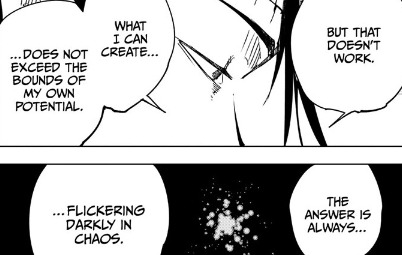
Kenjaku goes to similiar motivations and has similiar extremes, he's uninvested in the world around him, he's lived a thousand years but has no attachment to the world, to life, to the people around him. I said that Junko wants to be a participant in life not an all seeing observer and that was purposeful language because to bring back an old post. I rambled on this post about Gojo that part of Gojo's problem is that he only experiences observer-to-object relationships or I to it.
Ich and Du, translated as I and Thou is a book by philosopher Martin Buber. His two main porositions is that we may address existence in two ways:
The attitude of the “I” towards “it” towards an object that is separate in itself, which we either use or experience.
The attitude of “I” towards “Thou” in a relationship in which the other is not separated by discrete bounds.
In Buber's terms, those who only experience the first type of relationships are only observing the world around them not relating to them. Kenjaku doesn't relate to other human beings because they are objects, he only experiences subject -> object relationships and never subject -> subject.
Buber also goes on to theorize that meaning in our lives comes from subject -> subject relationships we form with other people.
Kenjaku jokingly says that to be his friend you have to never bore him and be his equal, but there's no one considers his equal because he's the subject and everyone else are just objects.

He regrets he can't sit down and talk theories with Tsukumo Yuki because she's one of the few people who think like him.

Kenjaku is a paradox of an incredibly brilliant man who is also shallow as a puddle that you can stand in and not get your socks wet. However, he tragically can't really form a more complex identity because our identities are formed by our relationships to other people and Kenjaku doesn't relate to anybody.
That's basically the theme of the whole Choso and Kenjaku fight, Choso is a weird aborted fetus of a curse who still has a strong identity and is able to feel unconditional love for Yuji because of the connection of family and the ideas of brotherhood that binds the two. Kenjaku is a bad father who abandoned Choso because they were "boring" but also never really gave them a chance to grow up or be interesting, he just dismissed them offhand and moved on to the next weird science project.
However, his reason for dismissing Choso isn't Choso's fault but rather a case of Psychological projection. It's not Choso who is boring, but rather Kenjaku himself, he said so earlier.
"What I can create, does not exceed the bounds of my own potential. The answer is always flickering darkly in chaos."
Kenjaku cannot look within to find anything satisfying abput his life because there's nothing inside of him. He doesn't have a fully formed identiy he's just ID, and because he tramples all over other people to form his desires he also cannot ever form a full ego. Just like Sukuna and most of the ancient sorcerers he's a paradox of being all ego, and yet having an underdeveloped ego with shallow motivators.
Kenjaku cannot look within because he's a boring person, and he cannot look for other people to find worth in his life because they're just objects, so instead he looks into the void, he tries to change the world around him by spreading more chaos hoping that it will make something unpredictable happen in front of his eyes - and that will give him the meaning and investment in his life he's deprived himself of because he refuses to form relationships with other people.
It's the Gojo problem. It's the Kashimo problem. It's not the Sukuna problem, because Sukuna admits he doesn't care about and rejects things like love and meaning.
If Kenjaku makes the world around him a more interesting place, he will be able to live in it. It's the same as Gojo trying to raise people up to his level by creating stronger students.
So after going to great length to demonstrate how powerful and all-consuming Kenjaku's boredom is, and how cut off he is from his own humanity, here's the part where I sort of defend his death.
Wouldn't it be funny if the joke character killed the main villain?
Let's be honest it was Takaba's kill here, Yuta just camped and killstole. I think part of the problem with people not understanding the meaning behind Kenjaku's sudden and unexpected death is attributing the death to Yuta cutting his head off out of nowhere, and not Takaba's thematic victory over Kenjaku.
Takaba represents a blindspot for Kenjaku which is why the main characters use him as a weapon against him, and he also calls out in a fashion Kenjaku's hypocrisy. First and foremost, Kenjaku presents himself as an agent of change, but he actually has no interest in many of the modern sorcerers and holds a bias towards the heian era as the peak of sorcery. He even says that he's going to bring back the Heian Golden Age to Sukuna at the end of Shibuya arc.
Because that's what Chaos is Kenjaku, things being the same as they were 1,000 years ago. Kenjaku is an agent of change and chaos and somehow his definition of change is... resetting things back to the past because the sorcerers of the past were so much better than today.

Kenjaku goes out of his way to awaken hundreds of modern day sorcerers, and then dismisses literally off of them except for Hiromi because they don't have enough potential for him compared to ancient sorcerers. He essentially did the same with the Death Painting Bros, he went through all of the trouble to create them, then dismissed them as not having enough potential BEFORE THEY EVEN GOT THE CHANCE TO GROW UP.
Kenjaku has a habit of just going BORED NOW and leaving before he even gives things the time to impress him. He does the same with the Culling Game, he set up the death game to push sorcerers to fight each other and bring out their powers, but he never actually intended to watch the sorcerers evolve. He just wanted to slaughter everyone inside to start the merger.
He goes through a lot of potential to set up these situations and then abandons them before they have the chance to even evolve, because they do not have enough "potential" in his opinion, but like his opinion is often shown to be wrong. Takaba represents that blindspot because he was one of the modern sorcerers that Kenjaku underestimated and dismissed offhand as boring without giving him a chance to shine.
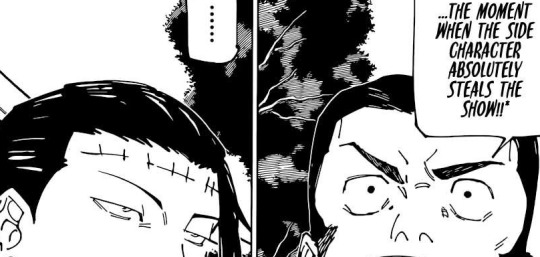
That is the joke that Takaba introduces himself with "Wouldn't it be funny if a random comic relief side character suddenly defeated the big bad?"
He's immediately pointing out a blindspot, because Kenjaku automatically believes himself to be an important character, he underestimates Takaba because he's a side character, one of the people Kenjaku has dismissed as boring and uninteresting (before they even had a chance to evolve into something else). Like that's the other thing Kenjaku wants things to evolve but he doesn't... let them. He abandoned Choso and the rest before they even grew up, they were literally fetuses and he threw them away. Kenjaku is the protagonist of reality, and Takaba is a side character, and therefore Takaba couldn't possibly harm him because Kenjaku and his boundless curiosity are the center of the world.
It's not just about subverting the audience's expectations to have the main villain die in such an anti-climactic way before the final act even starts, but it's pointing out how narrow Kenjaku's viewpoints really were all along. He wants everything to be surprised but he never lets anything surprise him, because either he gets bored right away, or he looks down on others before giving them the chance to evolve, or the third thing he just straight up has to control everything. He can't let the culling game evolve naturally he's going to slaughter all the players by hand so he can move onto the next part.
It's the contradiction between a schemer who needs to control everything and everyone to bring about his intended result and everything needs to be a part of his big plans, to someone who wants to be surprised by others and have things go off the rails. You can't have both of these things at once, Kenjaku cannot have things surprise him if he rigs everything to go his way with his overly elaborate schemes and his tight-fisted control of everyone in the story.
Like, in comparison to Kenjaku the joker just blows things up and sprays people with laughing gas. They're both playing the same game but the joker is having fun and Kenjaku isn't.
Kenjaku wants an unexpected future, but he doesn't care about any of the modern sorcerers and has a bias towards the heiean era that he considers the height and wants to reset things to bring back the heian era. He wants to be surprised but won't give up control.
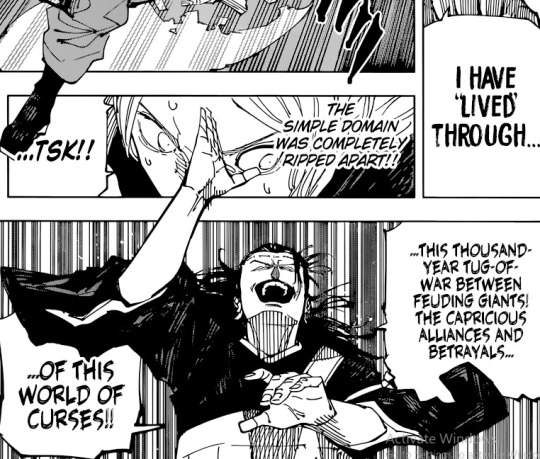
Kenjaku's boast is that unlike Tengen he's spent a thousand years living on the ground instead of lording up on them from above like some deity, but is that true? Has Kenjaku lived? Has he engaged with the world? Formed relationships with people? Or does he just sit in the corner rubbing his hands together menacingly and scheming his schemes.
Takaba unironically gives Kenjaku what he wants, something he's never seen before in a thousand years, and it's from a place Kenjaku never expected. Some random guy, who he dismissed as one of the boring modern sorcerers with no potential like Higuruma.
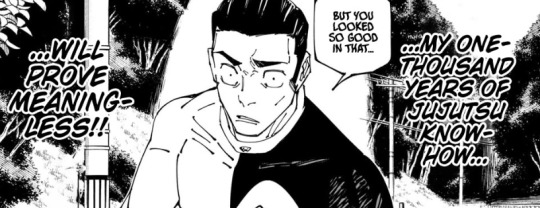
Takaba not only exists in Kenjaku's blindspot, he almost immediately points out Kenjaku's second hypocrisy. If he's willing to resort to mass murder just to feel entertained, then if he found something else to entertain him there'd be no reason to get violent and scheme his schemes.

In other words Kenjaku hasn't really gone looking for other places to try to find what makes life worth living, or at least enertaining, he hasn't really tried any alternatives to finding joy in life because Jujutsu is all he cares about. Takaba says that if he found something else even more entertaining than the merger there'd be no need to go through with the merger, and he turns out to be right. Kenjaku could have found meaning and entertainment with the world someplace else, he was just too narrow minded and never looked anywhere else.
As I said from the beginning Kenjaku's existential crisis comes from his inability to relate to other people and viewing them all as objects, but in Kenjaku's mind of course he can't relate to others they're too boring, so therefore it's the world's fault, and the fault of others and not himself.
However, right away one of those boring people starts relating to Kenjaku.

I joked about how we know nothing about the Gojo clan but Takaba gets an entire backstory chapter about his failed comedy career, but this chapter is plot important because jokes are the way that Takaba relates to and forms relationships with other people. Takaba makes jokes to relate to others but has a fallout with a comedy partner and has never been able to form a lasting relationship with a comedic partner because comedy doesn't mean the same to them as it does to him - because to Takaba comedy is about forming relationships with people. Which is why he thinks he's failed if he's failed to make everyone in the audience laugh because he wants to make comedy that will make other people relate to him and understand him.
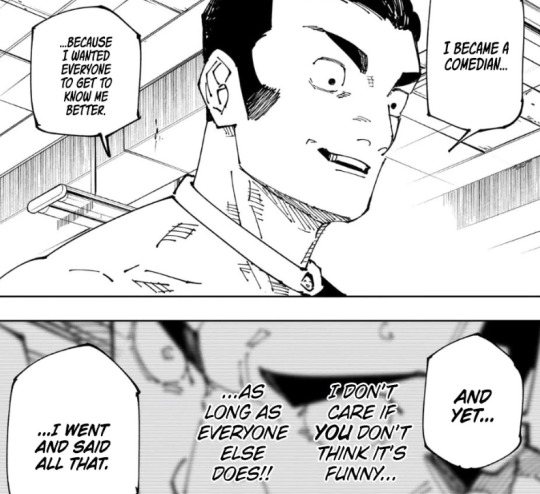
However, he almost gives up on comedy because he's afraid that he might fail on that endeavor. He gives up on striving to make everybody in the audience laugh, because of self-affirmation and a desire to protect himself. He didn't want to fail so he started distancing himself from the audience under the excuse "Well, I can't make everyone laugh so it's okay if not everyone understands me."

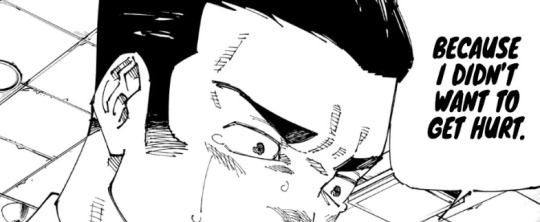
Takaba at some point gave up on trying to use comedy as a means of understanding and relating to others, because of his fear of failure and at that point he nearly lost - but he rallies himself by saying that he won't give up on making someone like Kenjaku laugh. If his comedy is about connecting to others, about understanding others and having others understand him then he can't just give up on Kenjaku and say it's Kenjaku's fault that Kenjaku can't relate to his sense of humor. He's got to try even harder to make Kenjaku laugh.

This is also pretty much the opposite of Kenjaku's point of view. For Kenjaku it's everyone else's fault for being so boring that's why he can't relate to them. Wheras, Takaba takes personal responsibility, he wasn't funny enough, he has to try harder, he's the one who's going to make Kenjaku laugh by improving himself. Takaba looks inward, and Kenjaku looks outwards because there's nothing inside Kenjaku.
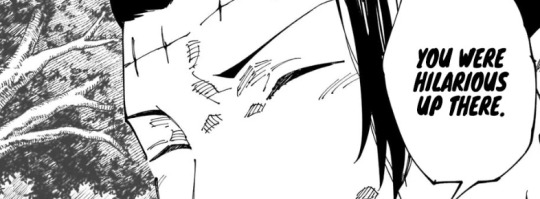
This is a parallel to this.
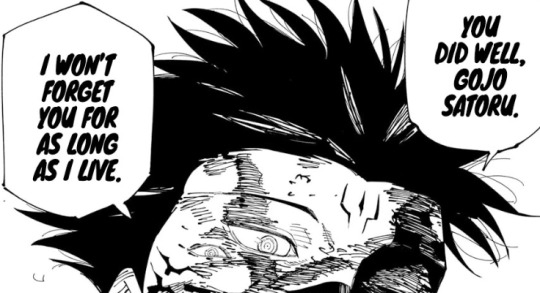
The difference however, is that Sukuna did not betray his ideology. Sukuna lives for the kicks that battle provides him and wants to face strong opponents so he can eventually devoured them and be momentarily entertained.
Like Sukuna is not bored the way Kenjaku is. The world is his playground. He may refer to living as just killing time until you die, but he also says that there's an infinite variety of humans to entertain yourself with. The world is Sukuna's toybox and he's satisfied with just that. In fact he doesn't even care about the merger, until his frustration with Yuji makes him think a little deeper about himself.

Kenjaku is not the Sukuna in this scene, he's the Gojo. He believed he was above others, only to be reminded suddenly that he was just the same as everyone else and brought back down to humanity. I mean, they even die off panel the same anticlimactic way. Gojo's infinity meant nothing in the face of one surprise attack a world-cleaving slash Gojo didn't see coming. All of Kenjaku's backup plans meant nothing in the face of Yuta camping and kill-stealing.


Kenjaku didn't lose because Yuta's plan of camping and killstealing was simply too brilliant for him to prepare for however, we're given the exact reason kenjaku lost - because he was having too much fun with Takaba.
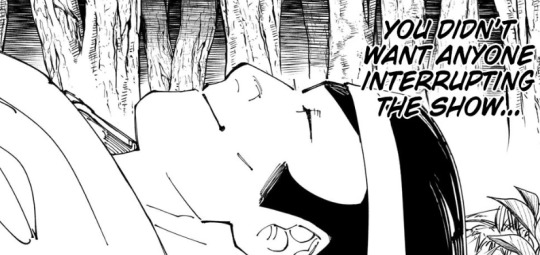
Which meant what Takaba said earlier was true, if Kenjaku found something funnier, something other than the merger that could make him laugh there'd be no need to go through with the merger to begin with.
Kenjaku loses because all along he could have related to people, formed meaningful relationships with others, looked for meaning in life outside of Jujutsu but just chose not to. Which is also a parallel to this.
Sukuna says that Kashimo and Gojo both lost because they were greedy. They already received love in a way, they had the love of everyone who regarded them as the strongest, they had people who earnestly wanted to challenge them and respected them - which Sukuna sees as a form of love, and yet they still wanted more.

They were the ones who put themselves up on that pedestal and decided to stand above all of humanity, they don't get to whine about being lonely on top of that.
To add my interpretation to Sukuna's speech, what he's outlining is a general conflict in Jujutsu Kaisen, you can choose to be all ego to put personal development above everything else but it comes at the cost of not being able to form relationships. Maki's as powerful as Toji now, but the sister she always wanted to protect is dead and basically committed suicide. Meanwhile Noritoshi Kamo didn't participate in the final battle, but he reconnected with his mother and half-brother.
There are plenty of characters who die and suffer in jujutsu kaisen because they chose to value other people above themselves, because Jujutsu Kaisen rewards selfishness and punishes selflessness / having an underdeveloped sense of self.
I'll pick Mechamaru as my biggest example, he lived to protect Miwa, and not only does he die an unsatisfying death, he also breaks her heart.
However, at least Mechamaru experienced love. His desire to protect Miwa is granted, because Miwa is also out of the final conflict. Mechamaru is one of the most miserable characters in the manga, and yet he experienced love in his life for someone else that made his brief life meaningful. The characters who choose love, and other people over strength tend to get stepped on, but they at least had that love in their life to begin with.
It's a having your cake and eating it too situation. Kashimo chose strength over love, and he got to be so strong he was unbeatable and lived to old age, but not only is he unfulfilled but he whines about being unable to relate to the people around him - you're the one who chose to step on everyone like bugs.
Characters in Jujutsu Kaisen don't just experience death when they try to be selfless however, like yeah there's a disproportionate amont of selfless minor characters who die, but like Yuji is the most selfless character in the manga and he's continually punished for it and yet he's the one referred to as a person with an unbreakable will.

Rather instead of Jujutsu Kiasen preferring the selfish side on the scale of selfishness / selflessness, the kind of messy, deaths that get handed out to people like Mechamaru happen when you betray the ideals you were living for. Whether they were selfish or selfless.

It goes back to Toji's internal monologue. You lose when you lose sight of yourself - like there's some deaths that don't fit the mould but for the most part, Gojo, Kashimo, Toji's and then Kenjaku's deaths all follow this pattern. By coincidence they also all take place offscreen for the most part (I suppose we see Yuta cut off Kenjaku's head but it's quick and unsatisfying compared to all the rest).
Kenjaku died because he betrayed what he was living for and he temporarily lost sight of himself. As I said Kenjaku's airtight principles were that everyone was boring and people weren't worth relating too so the only way to find enertainment in life is to cause chaos - but he found himself relating to some nobody he wrote off as a minor character Takaba and having fun with him. Which meant the belief he was false, he could have tried relating to other people all along he just didn't.
He warped his sense of self to reaffirm his identity. Takaba almost did that too, he tried to blame other people for not finding him funny to protect himself, but he moved past that and redoubled his efforts to make Kenjaku laugh.
There's also the added layer of irony that Kenjaku's sudden death brings about, the person who spent a thousand years trying to make the merger happen doesn't get to see it.
However, here's my assertion on why Kenjaku's death before the merger always had to happen.
Because, even if Kenjaku had seen the merger he still would have been bored.
Literally everything about Kenjaku's character and previous actions shows that even if he made his big scheme come true, he would have gone "meh" and moved onto the next scheme because that's how he always reacts.
He got bored of the death painting siblings, he presumably got bored of Yuji, he got bored of all the ancient sorcerers and new sorcerers he made for the culling game, he worked with the disaster curses and got bored of them and dismissed them as inferior primitive curses, he goes out of the way to engineer these chaotic situations and then never feels any satisfaction from them so why would the Merger be any different?
Not only did Kenjaku die before he saw the merger, he was basically doomed to never see the merger, because it would not have fixed whatever is wrong inside of him.
Because it's not the world that's boring, it's Kenjaku himself.
He gets a brief glimpse of what he could have done in life, that he could have tried to forge connections with the people around him and related to them on a personal level - and then he dies the way he lived, in a kind of boring and unsatisfying way.
It's the narrative punishing him in a way, the same way it punished Gojo, and Kashimo, by not letting him see the big explosion after he went to all the trouble rigging the bombs. It's punishing him for the same reason too - by deviating from his true self and showing what he thought were his reasons were shallow all along. Gojo could have always related to people he just chose to stand on his pedestal alone, and Kenjaku could have always found the world to be more enertaining he was the one dismissing other people as boring without giving them a chance to grow.
Takaba confronted his beliefs and then stayed true to his ideology of making everyone, 100% of the people in the crowd laugh. Kenjaku didn't confront his beliefs, he strayed from them because he didn't have the strength of character to evaluate himself the way Takaba did.
Hence, he's finished off by one of those boring people who used their power in a way he never expected. The main villain is defeated by the comic relief character and it's hilarious.
#jjk meta#kenjaku#fumihiko takaba#ryomen sukuna#jujutsu kaisen#jujutsu kaisen theory#jujutsu kaisen analysis#jjk spoiler#jujutsu kaisne spoiler#big spoiler actually
231 notes
·
View notes